
The Project Gutenberg EBook of Bible Pictures and Stories in Large Print, by Isabella M. Aldon This eBook is for the use of anyone anywhere in the United States and most other parts of the world at no cost and with almost no restrictions whatsoever. You may copy it, give it away or re-use it under the terms of the Project Gutenberg License included with this eBook or online at www.gutenberg.org. If you are not located in the United States, you'll have to check the laws of the country where you are located before using this ebook. Title: Bible Pictures and Stories in Large Print Author: Isabella M. Aldon Release Date: November 26, 2019 [EBook #60793] Language: English Character set encoding: UTF-8 *** START OF THIS PROJECT GUTENBERG EBOOK BIBLE PICTURES, STORIES--LARGE PRINT *** Produced by Richard Hulse and the Online Distributed Proofreading Team at http://www.pgdp.net (This file was produced from images generously made available by The Internet Archive)


BIBLE PICTURES
AND
STORIES
IN LARGE PRINT
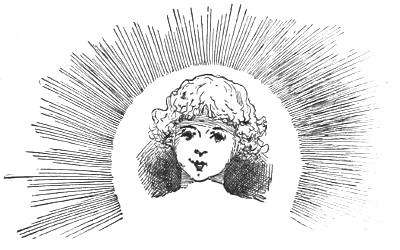
BOSTON
LOTHROP PUBLISHING COMPANY
Copyright, 1898,
by
Lothrop Publishing Company.
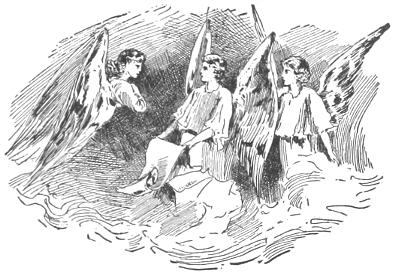
God made the sun, the moon, the stars, the earth, the sea and all the beasts, birds, insects, plants and fishes. After that He made man, then woman. Adam was the first man, Eve the first woman. He planted a lovely garden and gave it to Adam and Eve to live in. There was every kind of luscious fruits in this garden and God was willing they should eat all but one; this He told them they must not even touch.
For a while they minded God and were happy, but one day they both ate some of this fruit. Then God was very angry and sorry for what they had done. He drove them out of the lovely garden forever.
Adam and Eve had two sons, Cain and Abel. Cain, when he got old enough, became a farmer, Abel a shepherd. They both brought gifts to God. Cain’s gift was fruit; Abel’s gift was the very best of his lambs. For some reason God liked Abel’s gift, but did not like Cain’s. This made Cain hate Abel so much that he killed him.
When God asked Cain what had become of his brother he said: “I know not: Am I my brother’s keeper?” But God, who sees everything, had seen what Cain had done and punished him by making him wander homeless and friendless over all the earth.

CAIN AND ABEL.
A great many years after Cain killed Abel—over a thousand perhaps—the people had grown to be so very wicked that God made up his mind to destroy them by a great flood. But there was one good old man Noah, whom God loved. So He had him build a huge boat or ark and told him to put into it all his own family, and two of every kind of animal on the earth. As soon as Noah had done this, the rain began to fall. It kept on raining for forty days and forty nights until everything was covered by the water, even the highest mountains. Nothing was saved except what was in the ark.

ENTERING THE ARK.
After Noah’s death, his sons and their families kept traveling westward. By and by they came to a beautiful plain. They were very tired of traveling, so they rested a long time. The plain pleased them so much that they thought they would like to live there always, and they began to build a great city and a high tower “whose top should reach unto Heaven.” God came down to see the city and the tower. The sight made him angry and at once he caused the workmen to speak different languages, so they could not understand one another and had to stop building. The tower is called Babel because God “did there confound the language of all the earth.”

THE TOWER OF BABEL.
Lot lived in Sodom, a city so wicked that not ten good men could be found there. One evening two angels came to Lot, to tell him that God was going to destroy the wicked city and to warn him to flee in the morning with his wife and daughters. Lot and his family heeded the angel’s warning and fled to Zoar, a city near by. Then God rained down fire and brimstone upon Sodom, until it was burned to ashes. Lot and his two daughters were saved, but Lot’s wife was turned into a pillar of salt, because she looked back at the burning city. This the angels had warned them not to do.

LOT ENTERING ZOAR.
In time there came to be so many Israelites in Egypt that Pharaoh began to be afraid of them. So he issued an order that all boy babies should be put to death. But one mother hid her baby boy three months. Then she made a little boat out of rushes, laid the baby in it, and put the boat in the water near the shore. A little while after she did this one of Pharaoh’s daughters came down to the river to bathe and saw the little boat. She had one of her maids wade out and get it. When she saw the little boy, she felt so sorry for him that she took him for her own son. She named him Moses, which means “drawn out of the water.”
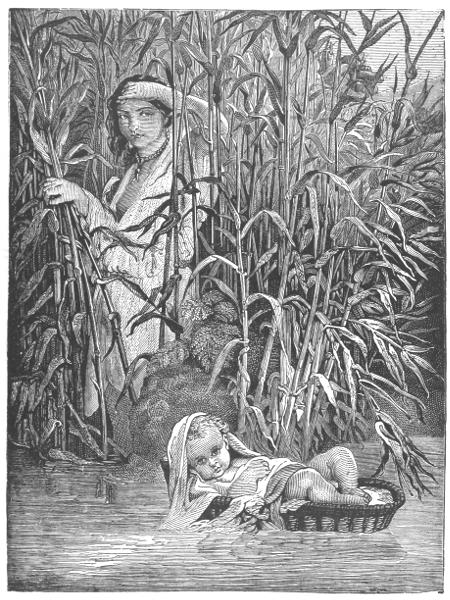
THE FINDING OF MOSES.
Pharaoh made the Israelites work very hard and treated them cruelly in other ways. God was sorry for his people, so he came to Moses and told him to go to Pharaoh with his brother Aaron and order him to let the Israelites go away from Egypt to a land He had made ready for them. But Pharaoh did not care anything about what God told him to do and would not let the people go. So God sent dreadful plagues upon the Egyptians. Still Pharaoh was stubborn and held out against God until the tenth plague came, which killed the eldest child in every Egyptian house. Then he sent the Israelites out of the land.
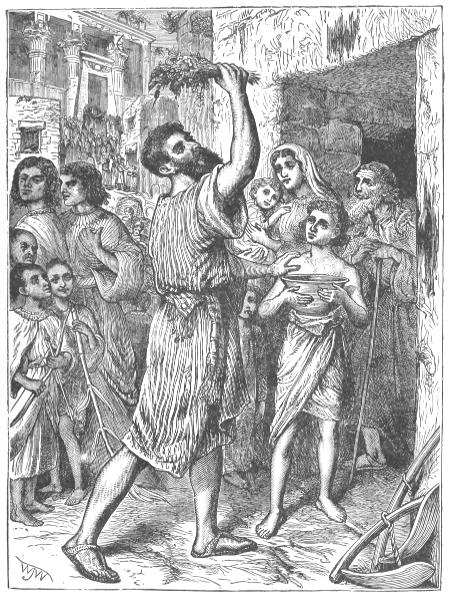
SPRINKLING THE BLOOD.
After the Israelites had been away from Egypt quite a long time, they came into a dry, stony country called the Wilderness, where there were no springs of water and no rivers. They got very thirsty, but could find nothing anywhere to drink. This made them angry with their leader, Moses, so angry that they were going to stone him to death. But Moses asked God to help him, saying: “What shall I do unto this people? they be almost ready to stone me.” God told him to take his rod and strike a certain rock on Mount Horeb. Moses did so. At once a clear stream of water burst out of the rock, enough for all the people.
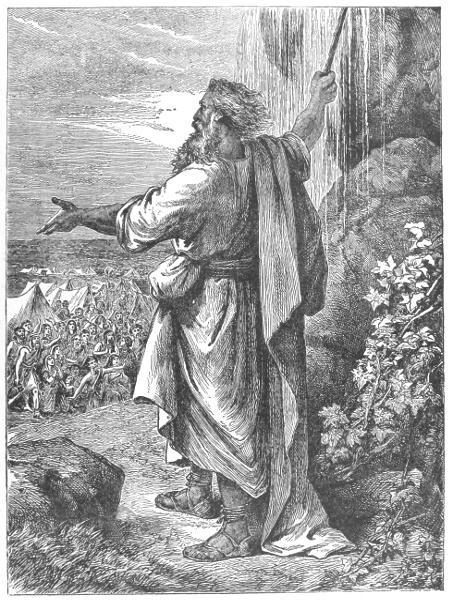
STRIKING THE ROCK.
When the Israelites came near Mount Sinai, God said that in three days from that time he would come down upon the mountain. But none of the people except Moses and Aaron were to touch the mountain. If they did, they would die. They could come up into the mountain and be with Him. God did as he promised. There was a thick cloud all about Him, and fire and smoke, and thunder and lightnings, so the people could not see him. And the mountain shook and the voice of God was heard like the sound of a trumpet, giving to them the Ten Commandments. And the people were afraid and drew back from the mountain.
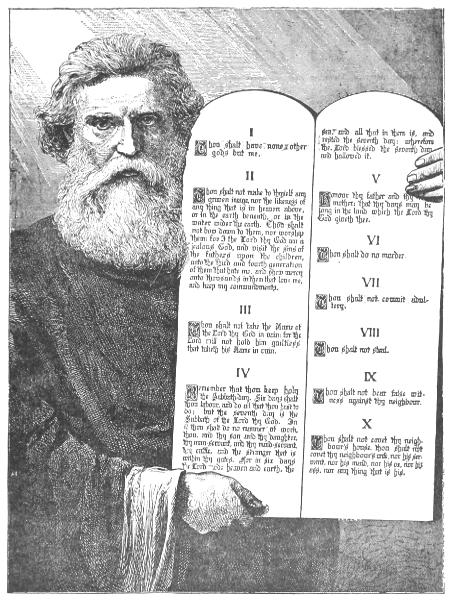
THE TEN COMMANDMENTS.
After God had given the Ten Commandments, Moses went up into the mountain and stayed with God forty days and forty nights. God told him that the Israelites must build Him a house to live in which should be called “The Tabernacle.” They must give gold, silver, brass, blue, purple, scarlet, fine linen, oils, spices, costly woods, jewels and other precious things, for this house. Bezaleel and Aholiab must build it, because He had made them wise. Moses told the people what God had said. They were so anxious to help that they brought more than God had asked for. And God’s beautiful house was soon made.
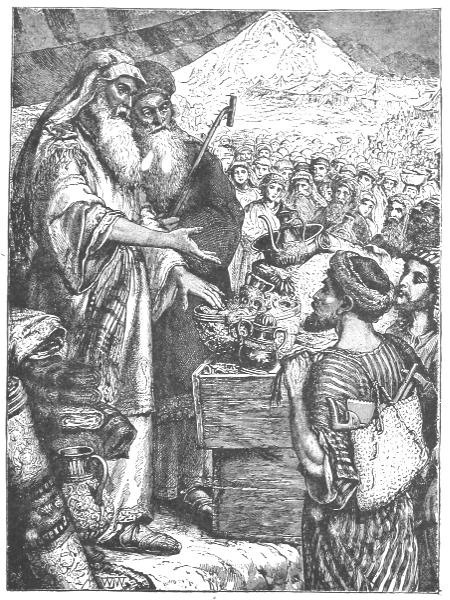
BEZALEEL AND AHOLIAB.
Once, almost forty years after they made God’s House, the Israelites were very hungry and thirsty. They said hateful things about Moses and about God too, which was very wicked. So God sent fiery serpents to bite the people. The bite was poisonous, and many died. Then they knew this was because they had done wrong. They came to Moses and asked him to pray God to take the serpents away. Moses prayed. God told Moses to make a brass serpent and set it on a pole where all the people could see it. When Moses had done this he told the people to look. Every one who was bitten was made well as soon as he saw the brass serpent.
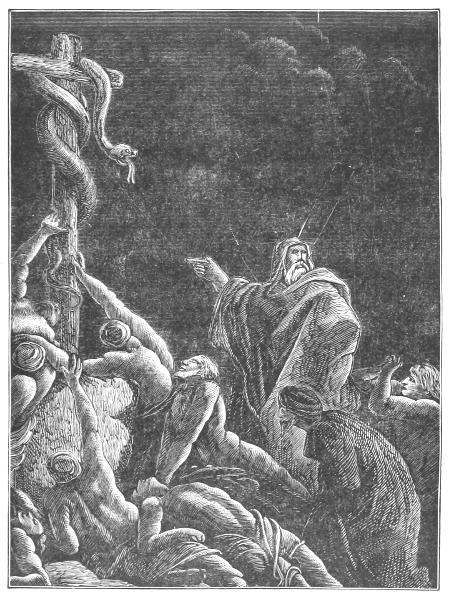
THE BRAZEN SERPENT.
After Moses died Joshua led the people of Israel. They had come very near to the land God had made ready for them, but there was still the great river Jordan to cross. They did not know how to get across, for the water was deep and they had no boats. But God had a way for them. He told Joshua to have the priests of his Tabernacle go into the water first and stand there. As soon as the feet of the priests touched the water it stopped flowing from above and piled up in a great heap. So the people went across the Jordan on dry land. After the priests left the river, the water flowed just as it had before.
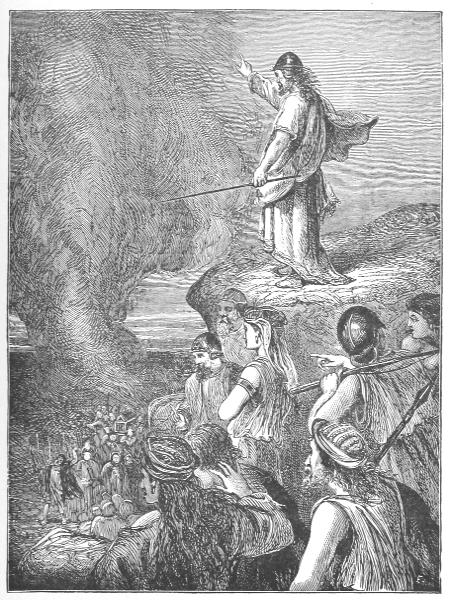
CROSSING THE JORDAN.
When the Canaanites heard how the Israelites had crossed the Jordan, they were afraid and shut themselves up in their city, Jericho. The Israelites had to find some way to break into the city. One day when Joshua was walking near the wall of Jericho, he saw a man with a drawn sword in his hand. He at once asked the man whether he was a friend or an enemy. The man answered: “As captain of the host of the Lord am I now come.” Then Joshua knew it was an angel and fell down and worshiped him. The angel said: “Loose thy shoe from off thy foot, for the place whereon thou standest is holy.” Joshua did so.
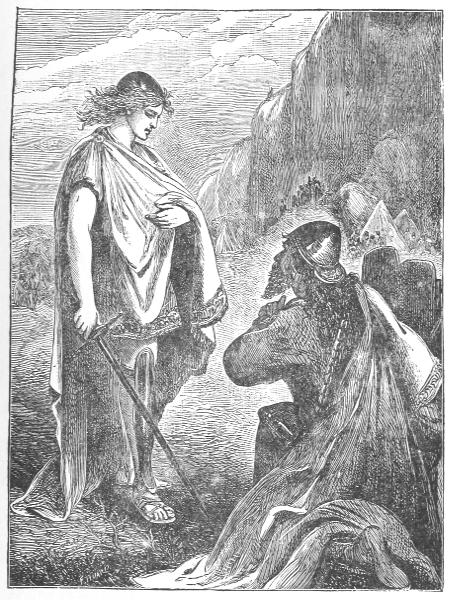
THE CAPTAIN OF THE LORD’S HOST.
The Israelites took Jericho in a very curious way. Every day for six days the armed men marched around the city once. On the seventh day they marched around seven times, while the priests blew their trumpets. Just as they finished the last march, the trumpets gave a long blast and all the people together gave a mighty shout. Then that strong, high wall fell down flat, and they went in and took the city and burnt it and everything in it except the silver and gold and vessels of brass and iron. The rest of the people of Canaan were greatly surprised when they heard how Jericho was captured.
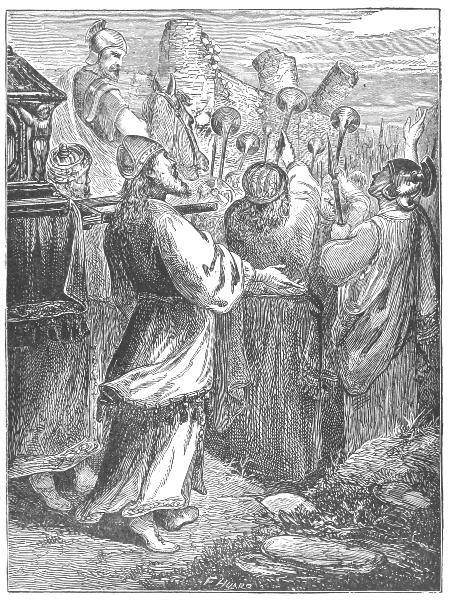
THE FALL OF JERICHO.
Ai was a city not far from Jericho. Three thousand Israelites went to take it. But some were killed and the rest got frightened and ran away. Joshua felt so badly that he went and told God all about it. God said that the Israelites had been beaten because one of them had kept for his own some of the silver and gold taken from Jericho. God pointed out that Achan was the man who had stolen these things and that he had hidden them in his tent. When they looked in the tent they found them buried in the ground. Achan and all his family and all that he had were stoned and burned and a great heap of stones raised over them as a warning.
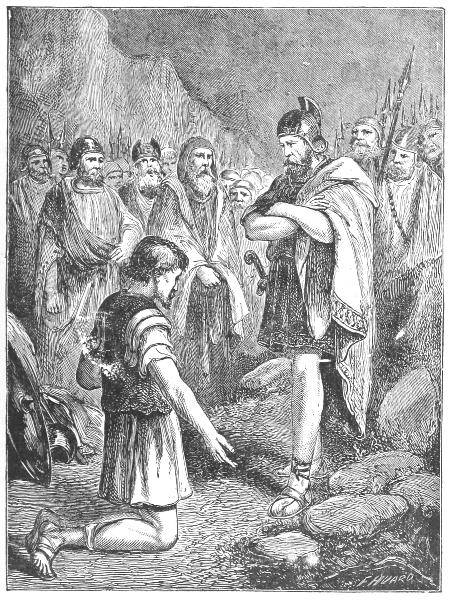
ACHAN CONFESSING HIS SIN.
After Achan had been burned, the Israelites captured Ai and hanged its king on a tree. Then Joshua built an altar to God on Mount Ebal of whole stones that had never been cut. On the altar he put burnt offerings. On the stones of the altar he wrote the laws that Moses had given to the people when he was alive. Then he got all the people together, men, women and little ones, and read to them God’s promises of the good things that would happen to them if they did right, and the bad things that would happen if they did wrong. The people listened carefully to the reading. Joshua did this because he had promised Moses that he would just before he died.
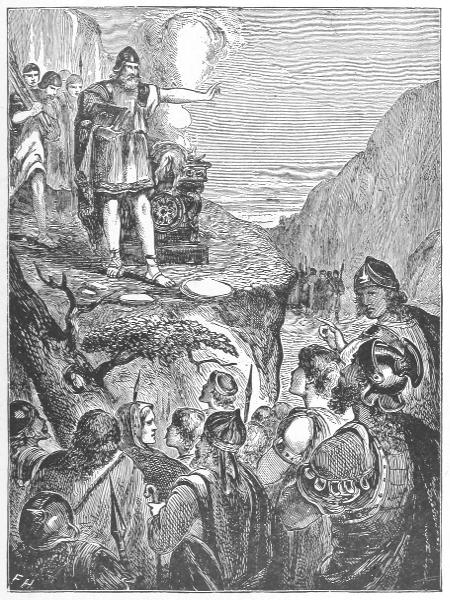
THE ALTAR ON MOUNT EBAL.
In those old times, when one man killed another, the friends of the dead man had the right to kill the murderer. But sometimes it happened that one person killed another without meaning to do it. Of course it was not right that he should be killed for what he could not help. God saw that there ought to be some way of saving him. So he told Joshua to name six cities to which such a person could flee and where no one could touch him. These cities were called Cities of Refuge. Three of them were on the west side of Jordan and three on the east. Some say that all the guide posts along the way had “Refuge!” “Refuge!” written on them.
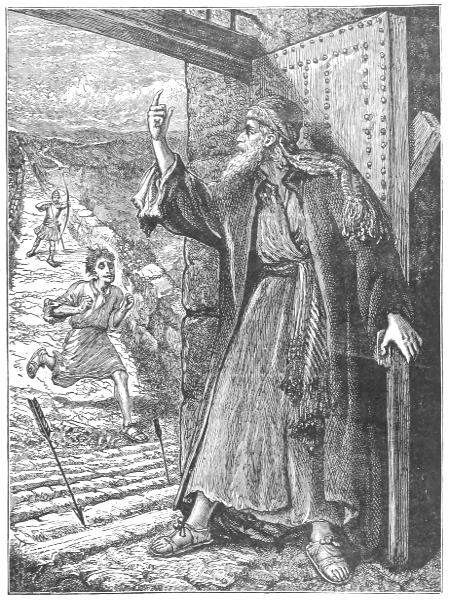
FLEEING TO THE CITY OF REFUGE.
A long time after the fall of Jericho, when Joshua was an old man, he made all the Israelites come into one place so that he could talk to them, before he left them, forever. He asked them to count over the good things God had done for them, and promised that He would do even more for them than He had already. He told them to be brave, to do as Moses had wanted them to do when he was alive, and never to have anything to do with people who worshiped idols. If they did, God would punish them. When Joshua had instructed the Israelites in all the good ways, having said all that was on his mind, he died. He was one hundred and ten years old.
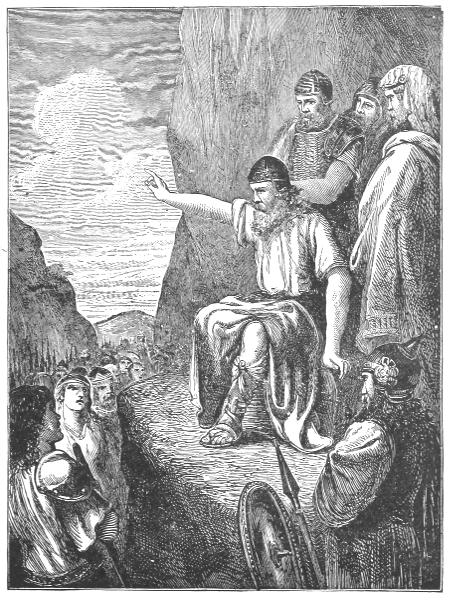
JOSHUA EXHORTING THE PEOPLE.
After Joshua died, the Israelites forgot God and worshiped idols. So God punished them as Joshua said. The Midianites came into the land and the Israelites had to hide from them in dens and caves. Gideon, a mighty man, was threshing corn one day when an angel came to him and told him to go and save Israel. Gideon was willing to go, but asked God to show him some sign that he would beat the Midianites. So one night God made a fleece that Gideon put on the ground wet with dew while all the ground was dry, and the next night he kept the fleece dry while all the ground was wet. Then Gideon knew that God would be on his side.
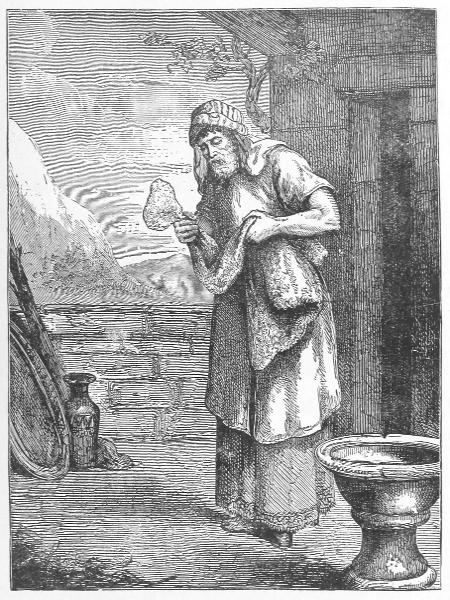
EXAMINING THE FLEECE.
Gideon got together a large army, but God told him that only a part must fight. So Gideon picked out the three hundred bravest men and divided them into three companies of one hundred each, and put a trumpet in each man’s hand and an empty pitcher and a lamp inside the pitcher. About the middle of the night they came to the camp of the Midianites and blew the trumpets and broke the pitchers and held up the lamps and cried “The sword of the Lord and of Gideon.” The Midianites were afraid and ran about and cried out and killed one another. The Israelites ran after them and drove them out of the country.
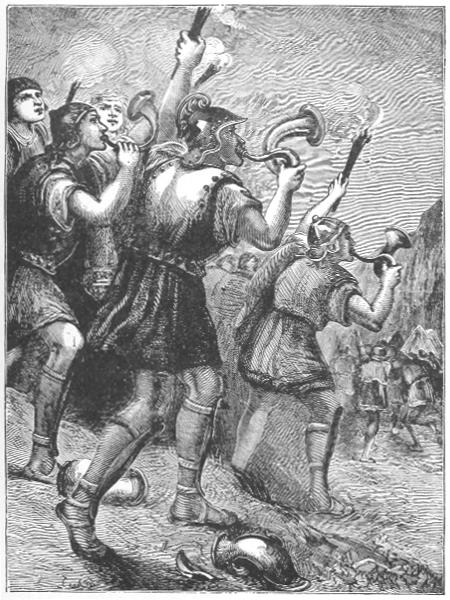
“THE SWORD OF THE LORD, AND OF GIDEON.”
Samson was the strongest man that ever lived. At one time he tore a live lion apart with his hands, at another he killed one thousand men, and at another he carried away the gates of Gaza, a city of the Philistines. But the very last thing that he did was the most wonderful of all. The Philistines had cruelly put out his eyes. At a feast where there were over three thousand of them, Samson got a boy to show him the way, and then putting his hands upon two pillars that held up the roof, and praying God for help, he pressed upon them with all his might. The pillars broke, the roof fell. Samson himself and the Philistines were killed.
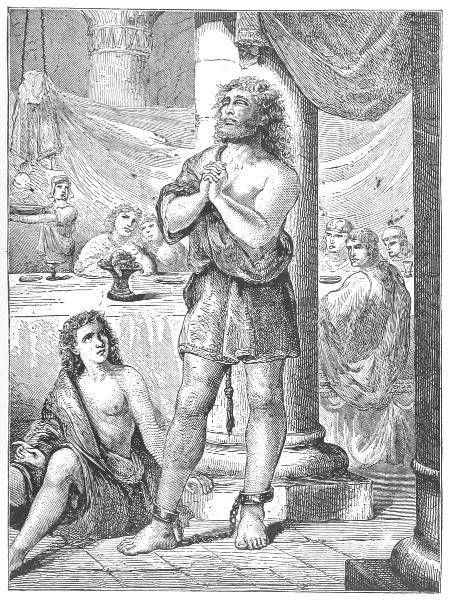
SAMSON AND THE PHILISTINES.
Naomi’s home was at Bethlehem. But one year, because there was no food there, she went to Moab with her husband and her two sons. Both the sons took wives in Moab. The wives’ names were Orpah and Ruth. After a little time Naomi’s husband died, then both the sons. Naomi started to go back to Bethlehem, and Orpah and Ruth started with her. But Naomi did not think they ought to leave their homes and advised them to stay in Moab. Orpah stayed. But Ruth said to Naomi: “Whither thou goest, I will go, and where thou lodgest I will lodge; thy people shall be my people and thy God, my God.” So Ruth and Naomi came to Bethlehem.
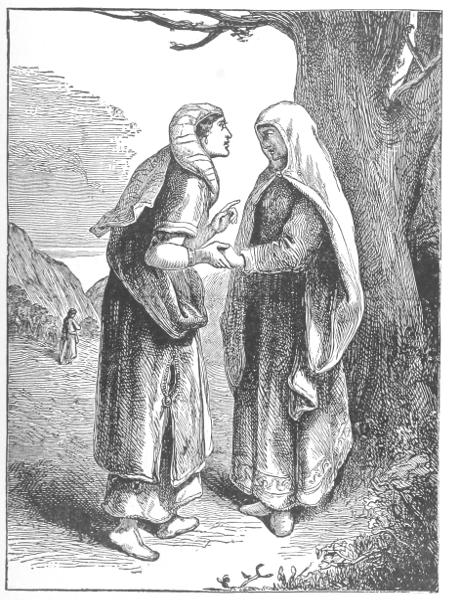
RUTH AND NAOMI.
Ruth and Naomi were poor. So Ruth went out to pick up the grain which the reapers let fall at their work. The field into which she went belonged to a rich man named Boaz. He was pleased with Ruth, and let her eat and drink with the reapers. He told her never to go anywhere else, but always to come to his field, and he made the reapers let fall some grain on purpose for her. So when she came home to Naomi at night, she had a very large bundle. Ruth went to that field all through the harvest. Afterward she became the wife of Boaz.
So you see Ruth did not lose anything by staying with Naomi.
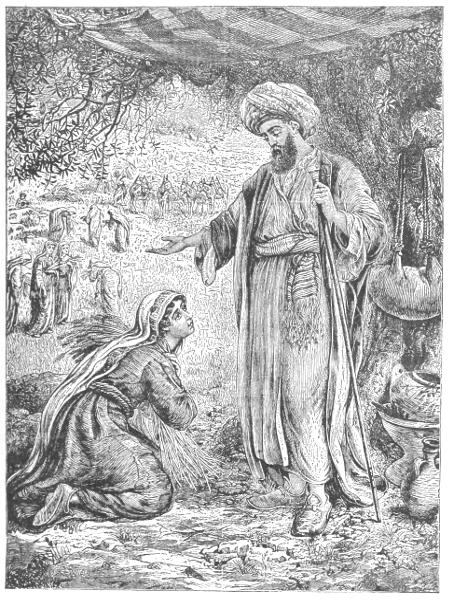
BOAZ SHOWING KINDNESS TO RUTH.
Once a year Samuel’s mother went to see him and always took with her a little coat. One night, when Samuel was asleep, he heard his name spoken. He thought Eli called him, and ran to see what he wanted. But Eli said he had not called him. So he went back to bed. Again he heard “Samuel,” and again he ran to Eli. But Eli had not called him. Still again he was called and ran to Eli. Then Eli knew that God had spoken and told him to say, “Speak, Lord, for thy servant heareth,” next time he was called. Samuel did this, and God told him of something terrible that was going to happen to Eli and his sons.
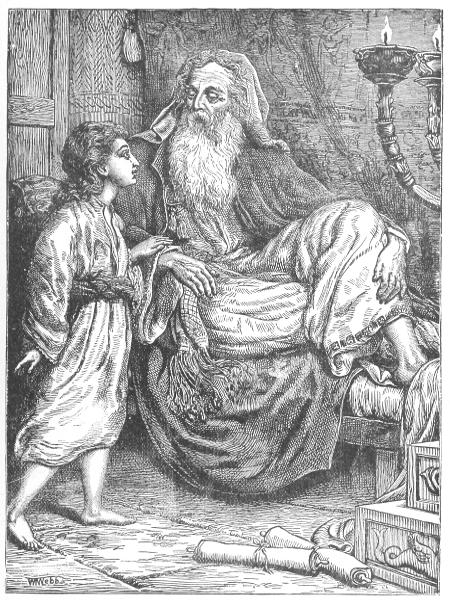
SAMUEL AND ELI.
A little while after God spoke to Samuel, the Israelites fought against the Philistines. They were beaten. Then they took the ark of God from the tabernacle and marched against the Philistines. At first the Philistines were afraid of the ark. But they fought bravely. The Israelites were again beaten. Eli’s two sons were killed and the ark of God was taken. Eli was then ninety-eight years old. He was blind. He was sitting on a bench by the roadside when he heard the sad news. He was so overcome by the intelligence he fell over backward and brake his neck. That was what God told Samuel would happen.
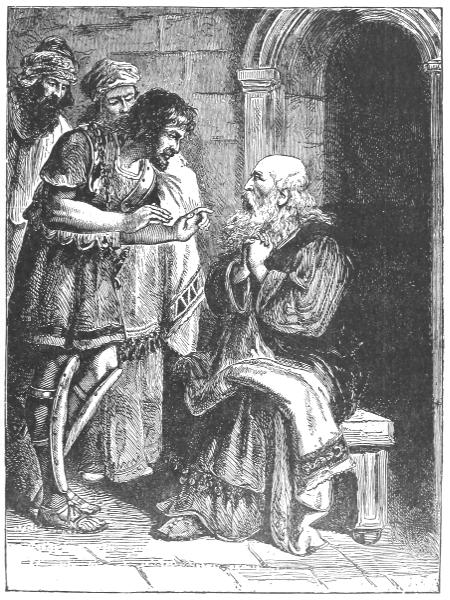
ELI RECEIVING THE NEWS OF THE DEATH OF HIS SONS.
Saul was the king of Israel. David was a shepherd boy, the son of Jesse. He had a happy, ruddy face that made everybody like him. Besides he was very brave. Once he killed both a lion and a bear that came to eat up the lambs in his father’s flock. He knew how to throw stones with a sling and could play on the harp beautifully. One day King Saul was feeling very sad and wanted somebody to play to him. He thought music would make him feel better. His servants told him about David. So he sent for him. David came and played so nicely on the harp that Saul forgot all about his trouble.
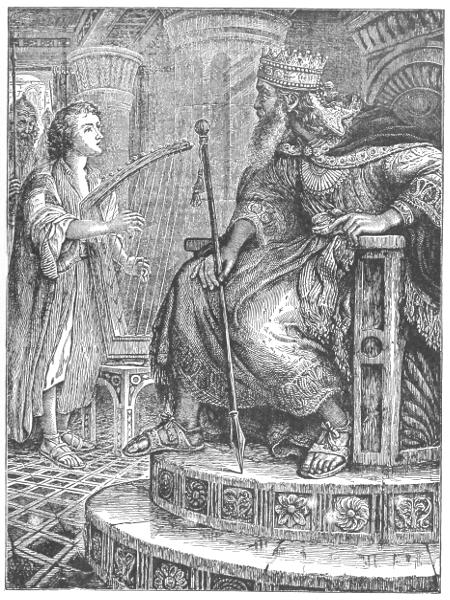
DAVID PLAYING ON THE HARP BEFORE SAUL.
The Israelites and Philistines were at war. Goliath was a Philistine giant. He used to come out in front of the Israelites every day and dare any one to fight with him. He was so big and strong that all the Israelites were afraid to try. One day David came to the camp on an errand, and when he saw Goliath he made up his mind to fight him. So he chose five smooth stones out of a brook and put them in his shepherd’s bag. Then with sling in hand he went toward Goliath. Goliath laughed at him, but David did not mind that. He threw a stone with his sling. It hit Goliath on the forehead and he fell to the ground. Then David cut off his head.
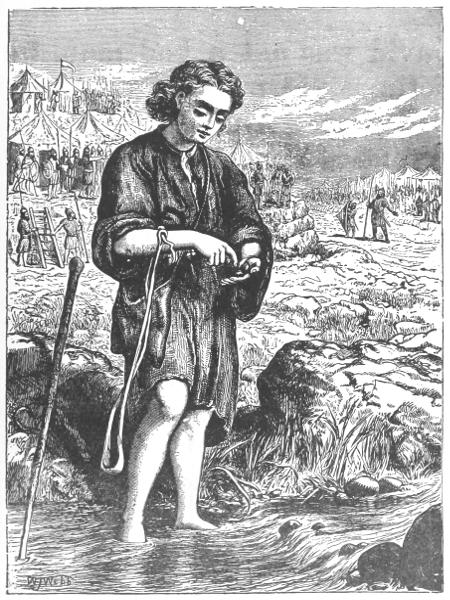
DAVID.
David was not a bad man, but he sometimes did wrong and then God had to punish him although He was very fond of him. When he had been king many years he had the Israelites counted. This displeased God and He sent a plague upon Israel. This plague killed many thousand people. David felt very sorry to have his people die for his sin and prayed God to stop the plague and punish him instead. God told David to go to the threshing-floor of Araunah and make an offering. David went. He bought the threshing-floor and some oxen and wood. Then he built an altar and made the offering. God stopped the plague.
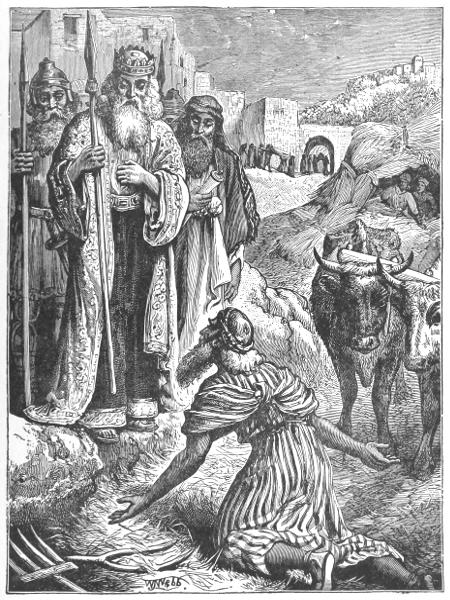
DAVID AND ARAUNAH.
Ahab was a very wicked king, more wicked than any that came before him. He took a wife who worshiped idols and built an altar to a heathen god and worshiped this god. So God sent Elijah to Ahab to say to him: “As the Lord of Israel liveth there shall not be dew nor rain these years.” Ahab was so angry at Elijah that he had to flee and hide himself by the brook Cherith near the river Jordan. The brook gave him all the water he needed, but there was no food there. But God would not let his prophet starve. He sent ravens to feed him. These ravens brought him bread and meat twice every day; in the morning and in the evening.
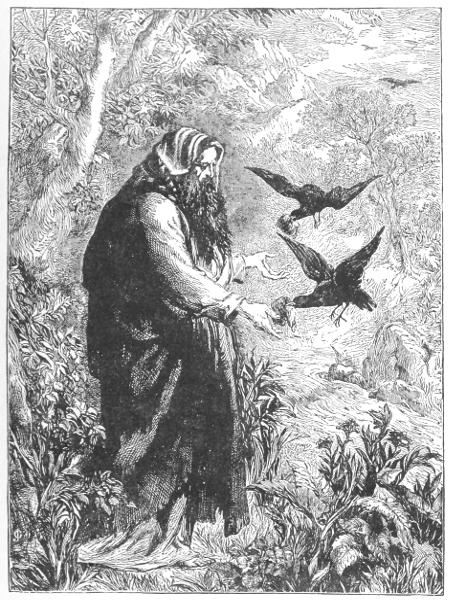
ELIJAH FED BY RAVENS.
One day Elijah was traveling through the land, when he saw twelve men ploughing with twelve yoke of oxen. One of these men was Elisha. When Elijah saw Elisha, he knew that he was the man God wished him to take for a servant. So Elijah threw his coat on Elisha as he went by. Then Elisha ran after Elijah and said: “Let me, I pray thee, kiss my father and mother and then I will follow thee.” He killed a yoke of oxen and made a feast. Then he said good-by to his father and mother and went away with Elijah. Afterward God took Elijah up to Heaven in a chariot of fire. Elisha was with him at the time.
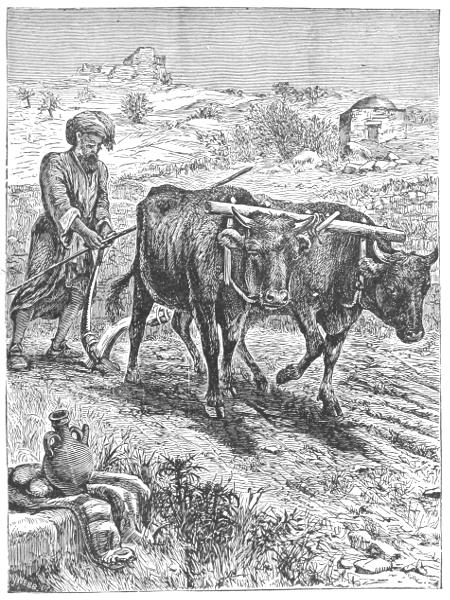
PLOUGHING IN CANAAN.
A kind Shunammite woman who liked Elisha made for him a little chamber on the wall. She made it cosey with a bed and table and stool and candlestick. Elisha used to come to this little room when he got tired. Now this good woman had a little boy whom she dearly loved, for he was her only child. One morning the little fellow was running about in the field with the reapers. All at once he felt a pain and ran to his father, crying, “My head! my head!” When the father saw his little son was not feeling well, he had him taken home to his mother. She held him in her lap till noon. Then he died. Elisha brought him back to life.
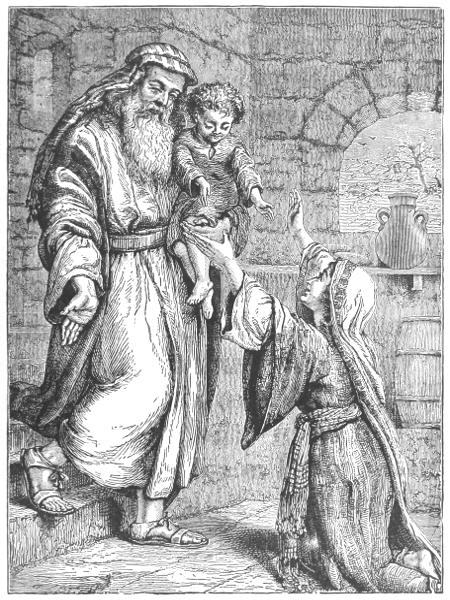
THE SHUNAMMITE’S SON RESTORED.
Naaman was a great Syrian general, who had beaten the Israelites in battle. He was very wretched because he was a leper. Now Naaman’s wife had a little Israelite girl to wait upon her, who had heard of the wonderful things Elisha had done. This little girl had told her mistress that Elisha could cure Naaman. So Naaman went with his chariot and horses to see Elisha. Elisha told him to wash seven times in the river Jordan. Naaman would not do this at first, it seemed such a little thing. But he finally changed his mind, and washed in the Jordan and was cured. You see how much good one little girl can do.
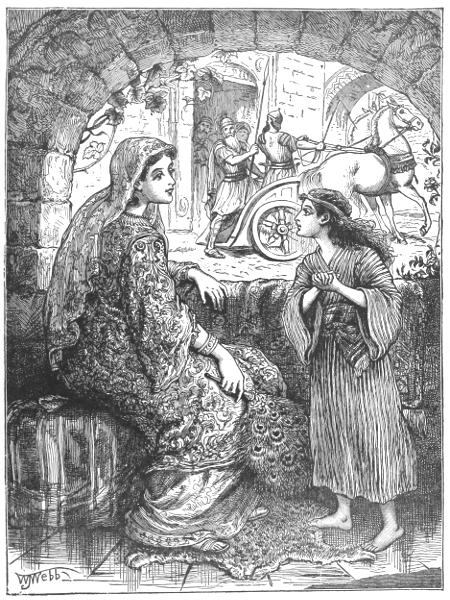
THE LITTLE CAPTIVE MAID.
God told Jonah to go to Nineveh and warn the people that their city would be destroyed because they were so wicked. But Jonah ran away to sea. There was a terrible storm on the sea, and the sailors threw Jonah overboard. They thought he was the cause of the storm. But he was not drowned, for God sent a great fish to swallow him. Jonah was inside the fish three days and three nights. Then God made the fish throw Jonah up on the dry land. After this God sent Jonah to Nineveh. But the people were so sorry for their sins that He took pity on them and did not destroy the city.
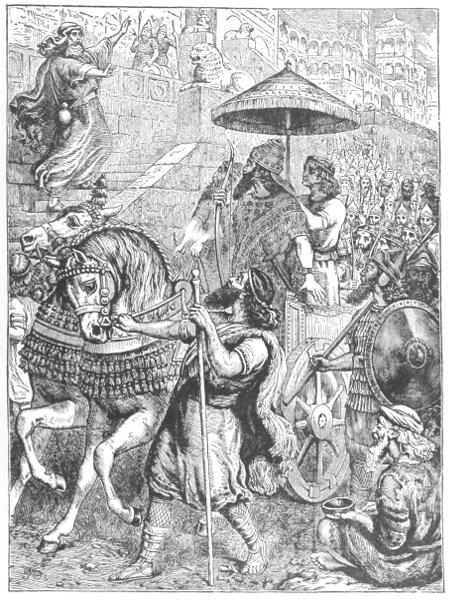
JONAH AT NINEVEH.
Hezekiah was the best king Judah ever had. The Bible says no king ever served God so well. When Hezekiah had been king fourteen years, Sennacherib, the king of Assyria, marched against Jerusalem. He sent a letter to Hezekiah, telling him to give up the city because his God could not help him. Hezekiah took this letter up into the temple. He spread it out before God and prayed Him to save Jerusalem. God heard his prayer. That night His angel went into the Assyrian camp and killed one hundred and eighty-five thousand of the Assyrians. Soon after this Sennacherib’s two sons killed him.
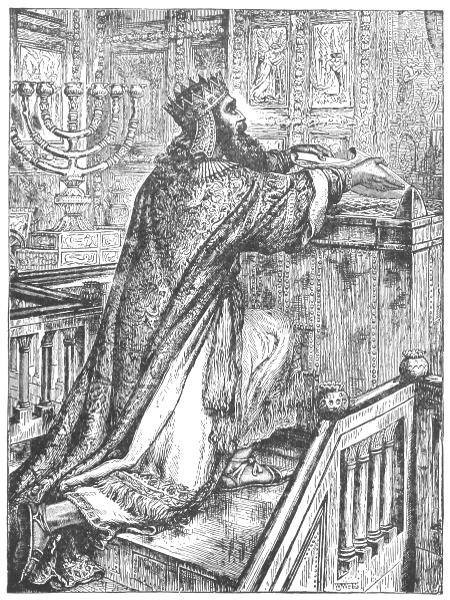
HEZEKIAH LAYING THE LETTER BEFORE GOD.
Daniel, Hananiah, Mishael and Azariah were four Hebrew boys who were prisoners at Babylon. They thought it was wrong to eat the meat and drink the wine the king sent, and refused both when offered them. They asked for plain food and pure water instead. But the servant was afraid they would grow thin if he gave them nothing else. Then the king would be angry at him and he would lose his life. Daniel told him to give them plain food and water for ten days. He did so. At the end of the ten days they seemed so much better than those who ate the meat and drank the wine that the servant was glad to do as they wished.
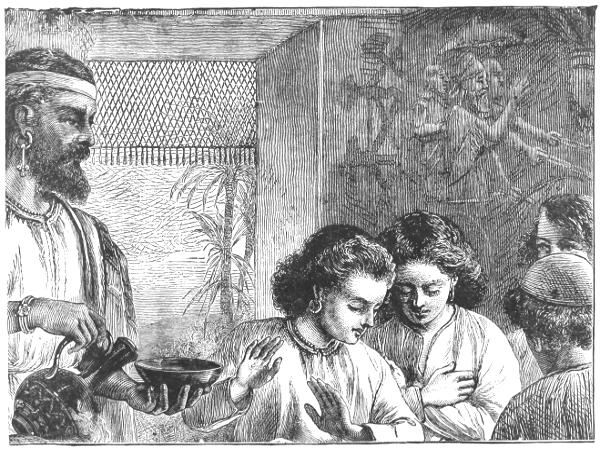
THE BRAVE HEBREW BOYS.
When Darius was king at Babylon he liked Daniel so well that he made him the chief officer in his kingdom. This made the other officers hate Daniel. They got Darius to make a law that every man who prayed to any one except Darius himself should be thrown into the den of lions. Daniel kept on praying to his God three times a day. When Darius heard that Daniel prayed he was very sorry he had made the law. But he could not change it, so Daniel was thrown into the lions’ den. That night Darius could not sleep, he felt so bad. Very early next morning he ran to the den. But Daniel was safe, for God had shut the lions’ mouths.
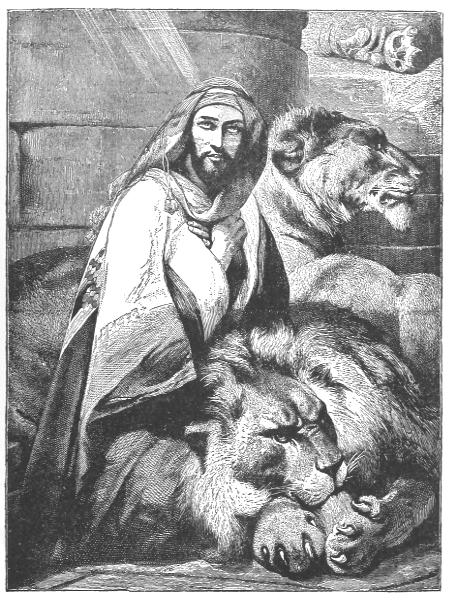
DANIEL AND THE LIONS.
Ahasuerus was king of Persia. Esther, a Jewess, was his queen. Haman was next to the king. He was a cruel man, and hated the Jews because one of them, a servant of the king, would not bow down to him. So he got the king to make a law that all the Jews in his kingdom should be killed. Esther felt very sorry for her people. She made up her mind to save them if she could. But first she spent three days in fasting and prayer. Then she went to the king and begged him to save the Jews. The king loved Esther so much that he did what she asked. So the Jews were saved from the cruel decree of the king Ahasuerus.
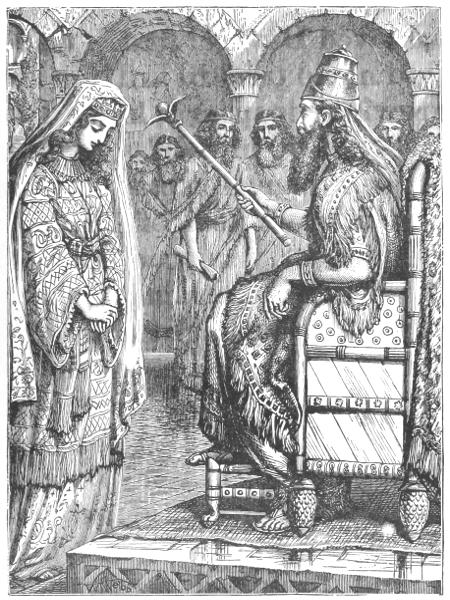
ESTHER BEFORE THE KING.
Saul loved David at first. Then he hated him and tried to kill him twice by throwing his spear at him. David escaped and hid himself. Now Saul had a son named Jonathan, who thought a great deal of David. It made him feel very bad to see his father trying to kill him. Jonathan thought that Saul might get over his anger in two or three days and take David back. But when he was sure that Saul really meant to kill David, he went to his hiding place and told him how he might get away. After they had wept and kissed each other and promised always to be friends, David fled and Jonathan went back to his father.
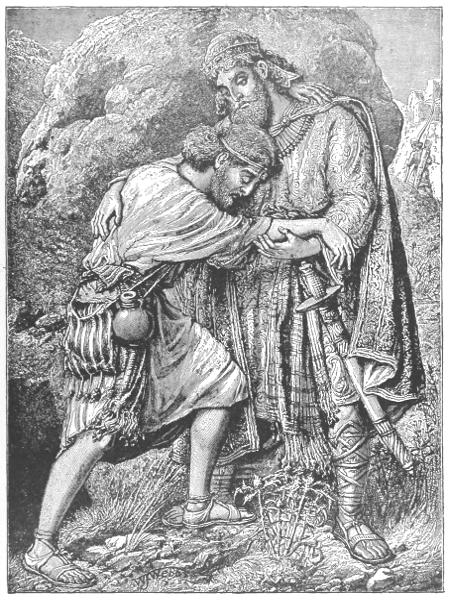
DAVID AND JONATHAN.
One night certain shepherds were out in the fields taking care of their sheep. Suddenly they saw a light brighter than the sun, and in the glory of the light, an angel. They felt afraid.
But the angel spoke to them; he said: “Fear not. I have good news for you, and for all the people in the world. There was born to-day, in the city of Bethlehem, a little child who is to be a Saviour; his name is Christ the Lord. You will find him lying in a manger.” As he spoke, suddenly there appeared a great company of angels, and they sang: “Glory to God in the highest, and on earth, peace, good-will toward men.”
When the angels were gone back to Heaven, the shepherds said to one another: “Let us go right away to Bethlehem, and find this wonderful baby that the Lord has sent us word about.”
So they started in haste. When they reached Bethlehem, they found the stable, and the manger, and there was the baby with his mother. Then the shepherds told what the angels had said and sung. The people wondered at it; the mother remembered every word, and thought about what it all meant. Then the shepherds went back to their work praising God as they went, for all that he had told them, and for all that they had seen.
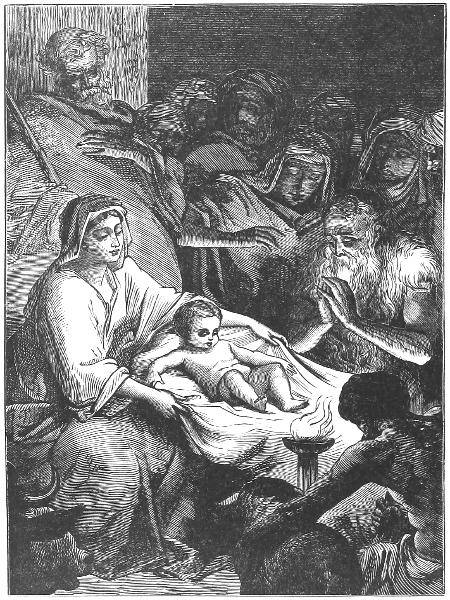
THE BIRTH OF CHRIST.—Matt. ii. 1.
The child Jesus grew strong in body and mind. He was so unlike any other child that he was “filled with wisdom.” God’s favor was with him all the time. When he was twelve years old he went with his father and mother to Jerusalem to the great yearly feast called the Passover. Having been there eight days, they started for home. But Jesus stayed behind at Jerusalem. His father and mother didn’t know it; they supposed him to be with some of the friends. At night when they stopped to rest, they found he was not to be found. They went among the friends and acquaintances who were travelling with them, but they got no news of him; so they turned back toward Jerusalem, looking for him all the way. In this way three days passed; then they found their son sitting in the church among the learned men, listening and asking questions. And the people who listened were astonished at the questions which Jesus asked, and at the words which he spoke. When his parents saw him, they were very much astonished. His mother said to him: “My son, why did you treat us in this way? Your father and I have hunted for you in great sorrow.”
Then he made this strange answer: “How is it that you sought me? Didn’t you know that I must be about my Father’s business?”
They didn’t understand what he meant; they forgot that their son was not simply a boy; he was God. But he came at once from the church, and went home with them, and obeyed his father and mother in everything. But his mother never forgot any of the strange words that he spoke.
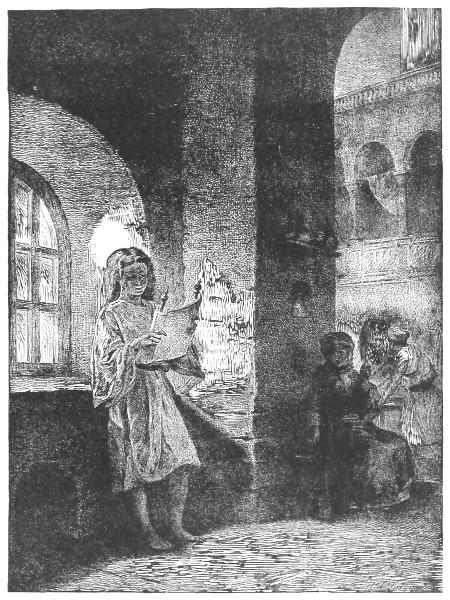
THE CHILD JESUS.—Luke ii. 40.
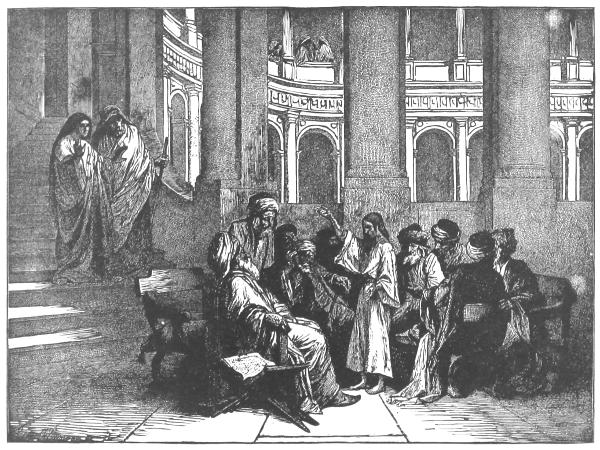
JESUS IN THE TEMPLE, TEACHING THE DOCTORS.—Luke ii. 46.
When Jesus had grown to be a young man, there came a minister through the country about Jordan, preaching to the people that they repent and be baptized. Some thought he was the Christ for whom they had been waiting. But he said to them: “I baptize you with water, but there is coming one, so much mightier than I, that I am not even worthy to untie his shoes [this was the work of the lowest servant]; He will baptize you with the Holy Ghost and with fire. He will make clean the hearts of his people. He will gather them in as wheat is gathered into the garner. But the wicked will be like chaff which is burned up, with a fire that cannot be put out.” Many other solemn things, also, this minister preached to the people. A man named Herod, ruler over part of the country, was angry with John because he had been reproved for many sins, among them marrying a woman whom he had no right to marry; and he put John in prison. But before that happened, one day, when John had been preaching and baptizing many people, Jesus came, and asked to be baptized also; and as he was praying, a wonderful thing happened. The Holy Ghost came down out of heaven in the form of a dove, and rested on Jesus, and a voice out of heaven said: “Thou art my beloved son; in thee I am well pleased.”
We find Jesus to-day in Nazareth, where he lived in his boyhood. It is the Sabbath-day, and he has gone to church, and stands reading to the people from the Bible. He read in the book named Isaiah; read about himself. These are the words: “The Spirit of the Lord is upon me, because He hath anointed me to preach the gospel to the poor; He hath sent me to heal the broken-hearted, to preach deliverance to the captives, and recovering of sight to the blind, to set at liberty them that are bruised, to preach the acceptable year of the Lord.” When he had read these wonderful words he closed the book, and gave it to the minister, and sat down. All the people looked at him, wondering what he would say. Then he began to talk. He told them that the promises he had been reading to them were fulfilled. All listened and wondered at the tender and beautiful words that he spoke. They whispered to each other, saying, “Isn’t this Joseph’s son?” Then he said to them: “You will surely remind me of the proverb, ‘Physician, heal thyself.’ Do some of the wonderful things here that we have heard of you doing in Capernaum. But, remember, no prophet is highly thought of in his own country. Remember that during that time of famine in Israel, when it didn’t rain for three years and six months, there were many widows, but the prophet Elijah was sent only to one at Sarepta, a city of Sidon. And there were many lepers in Israel while the prophet Elisha lived there; but Naaman, the Syrian, was the only one that was cured.”
This preaching made the people angry, and they started up in wrath and thrust him out of their city, and wanted to push him headlong down the hill on the top of which Nazareth was built. But just there he showed his power, in passing quietly through the crowd of angry people, holding them back by the power of his gaze, and went away.
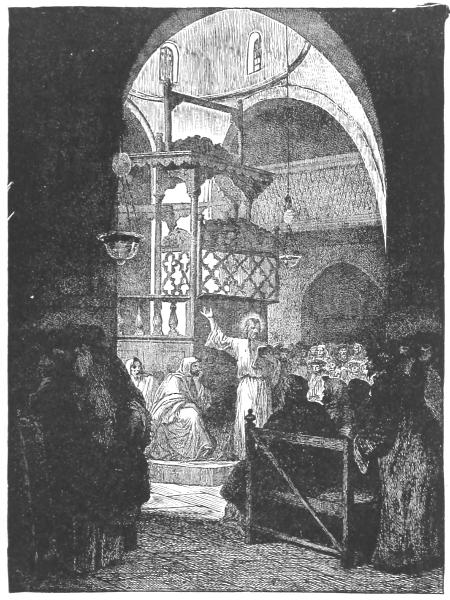
JESUS IN THE TEMPLE, READING THE BIBLE.—Luke iv. 16.
Jesus stood by the shore of Lake Gennesaret, and the people pressed about him, to hear him talk about God. He saw two ships near the water; they were empty, for the fishermen to whom they belonged were gone to wash their nets. One of the ships belonged to a man named Simon. Jesus stepped into it, and when Simon came asked him to push out a little from the shore; then he sat down in the ship and taught the people. When the sermon was over he said to Simon: “Push out now where it is deep, and let down your net.” Simon answered: “We have been at work all night, Master, and have caught no fish; but we will do as you say.” So they let down the net into the water, and at once it became so full of fish that it began to break. Then Simon and the other fisherman called to their partners, who were in the other ship, to come and help. They came and filled both the ships with fish; then the ships began to sink. Simon Peter, seeing that, fell on his knees and began to pray; he said: “Depart from me, for I am a sinful man, O Lord.” He meant that he was not worthy to be near the Lord. He was astonished and frightened, and so were the others—James and John, and they were the sons of Zebedee. Jesus spoke kindly and tenderly to Simon; he said: “Fear not; after this you shall catch men.”
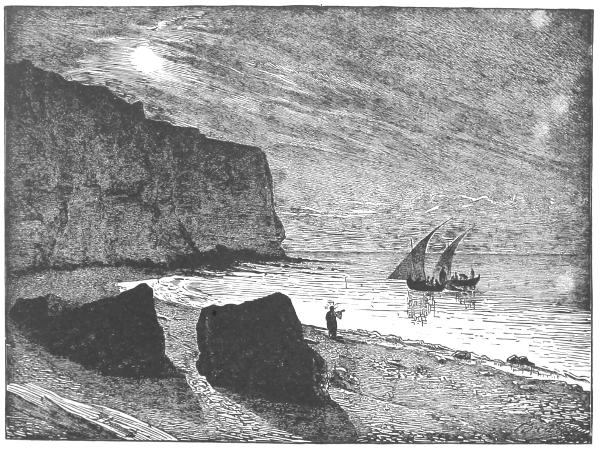
MIRACULOUS DRAUGHT OF FISHES.—John xxi. 4.
Next we find Jesus at Capernaum. A certain Roman military officer lived there, who had a servant lying very sick. The officer loved his faithful servant. He saw that he was going to die. He had heard of Jesus, and he sent some of the elders to him, begging that he would come and cure the sick man. The messengers came to Jesus and urged him to go at once to the sick one; they told him how kind the officer had been to their people. He went with them. When they were near the house, other friends came out to meet the Saviour, and presently the officer came himself. He told Jesus that he did not feel himself worthy to have so great a man in his house; that he did not want to trouble him to go there, and at first he thought he ought not even to come to him, troubling him. He begged that Jesus would just then and there speak a word that should cure his servant. He said that he was a man in authority, having servants who obeyed orders. Jesus, he believed, had but to give orders, and his invisible servants would obey him. Jesus wondered at his faith.
He turned, and said to the people who were following: “I haven’t found such great faith as this in all Israel.” Some of those who had been sent to Jesus, now reached the house where the sick man had lain, and behold he was well! This story is also told in Matthew viii. 5-13.
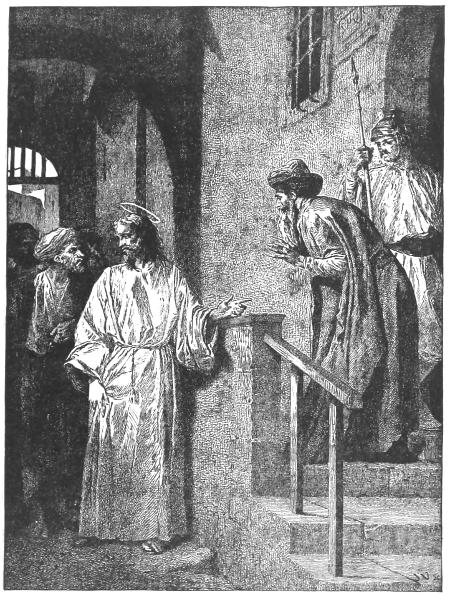
THE CENTURION.—Matt. viii. 8.
Once Jesus went to the city of Nain. His disciples went with him. Many people followed him. As he reached the city gate he met a funeral procession. It was a long procession, for the young man who was dead had been his mother’s only son, and she was a widow. The people were very sorry for her. Jesus, when he saw her, felt very sorry for her, too. He spoke to her. He said, “Weep not.” Then he went towards the frame on which the dead body was laid, and touched it; and the men who were carrying it stood still, and Jesus spoke to the dead. He said, “Young man, I say unto thee, arise.” Immediately the dead man sat up and spoke to Jesus; and Jesus called his mother to him. This wonderful thing made the people afraid; they said, “A great prophet has come among us.” And they praised God for sending him. This story was told all over the country, and for many miles around. When the people came together they said, “Have you heard how that poor widow who lives in Nain had her son given back to her after he was dead?”
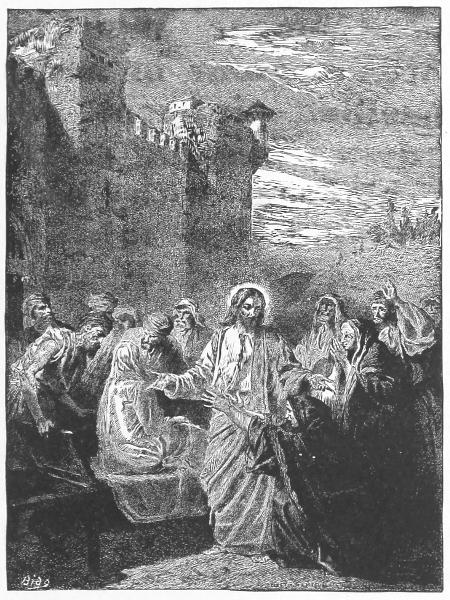
JESUS RAISETH THE WIDOW’S SON.—Luke vii. 14-15.
Jesus was invited to dine with a man named Simon. While at table, a poor woman came in and poured sweet-smelling ointment over the feet of Jesus, weeping so that she washed his feet with her tears. Simon did not like this, for the woman was very wicked. He thought if Jesus were a prophet he would know what sort of a woman this was, and would not allow her to touch him. Jesus saw these thoughts in his heart, and told him he had something to say to him. Then he told him this story: “There was once a man who was owed by two men; one owed him five hundred pence, and the other fifty. Both were poor, having nothing with which to pay their debt. The good man knowing this, forgave them both. Tell me, which of them will love him most?”
“Why,” said Simon, “I suppose the one who owed the most.”
“Yes,” said Jesus, “that is true. Simon, do you see this poor woman? You gave me no water to wash my feet, but she has washed them with her tears, and wiped them with her hair. You gave me no kiss, but she continues to kiss my feet. You did not even anoint my head, but she has anointed my feet. Now I tell you this: her sins which are many, are forgiven, for she loves me very much. If people feel that they have but little to be forgiven, they have but little love.” Then he spoke to the woman; he said: “Your sins are forgiven.” Those who were sitting with him at table began to say among themselves, “Why, who is this man who can forgive sins?” Jesus spoke again to the woman; he said: “Thy faith hath saved thee; go in peace.”
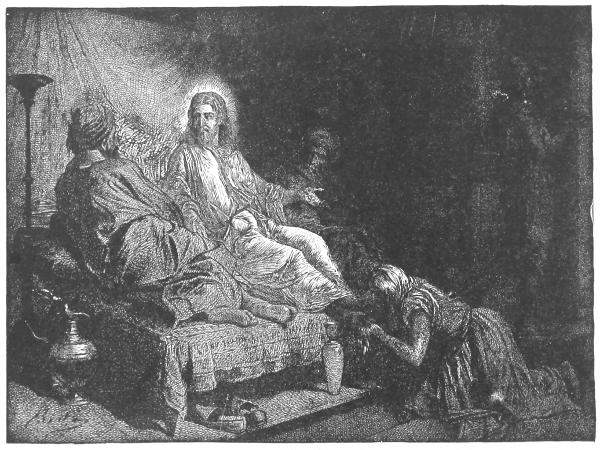
MARY MAGDALEN ANOINTING THE FEET OF JESUS.—Luke vii. 38.
Seventy people were sent out in many directions to tell the people of the Lord Jesus. They had blessed meetings. They came back filled with joy. They told Jesus that they had found even devils who had to obey their words when they spoke in his name. Jesus told them that he had long known that Satan would be subject to him. Also he promised them that nothing should hurt them in their work, neither that serpent Satan, nor any of his helpers. But he reminded them, that though they had such great power given them, there was something better than that for them to rejoice over forever: that their names were written in heaven. Then Jesus, with great joy in his heart, thanked God that he had hidden many things from the worldly-wise and the selfishly prudent, and had made them known to the humble-hearted who were willing to be like little children and learn of him. He reminded his disciples that no man knew about the mysteries of God, but that all things were delivered to him, and that no one could understand the Father unless he made him plain to their hearts. And he said to those disciples aside, “Blessed are the eyes which see the things that you see; many prophets and kings desired to see them, but were not permitted.”
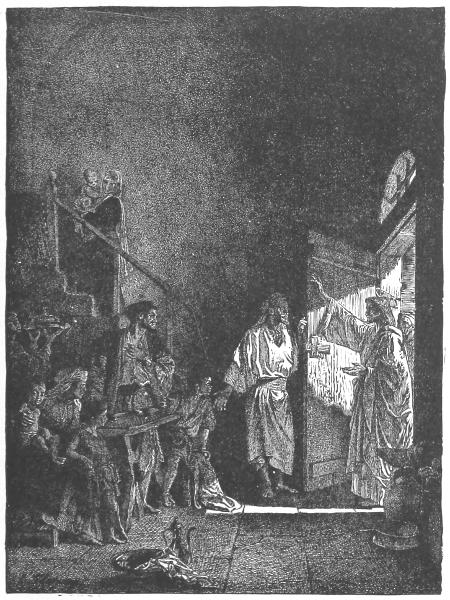
AND WHEN YE COME INTO AN HOUSE, SALUTE IT.—Matt. x. 12.
A lawyer once asked Jesus who was his neighbor, and Jesus told him this story:—“Once a man went from Jerusalem to Jericho, and on the road he met a party of thieves. They stripped his clothes from him; they wounded him, and at last went away, leaving him lying half dead. A little while after a certain minister passed that way; he saw the man, but he crossed the street and went on. Then there came a Levite; he stopped and looked at the poor man, and then he too crossed the street and went on his way. Then there came a Samaritan; he stopped and looked at the poor man, and his heart was filled with pity. The man was nothing to him, not even one of his own nation; but he bound up his wounds, pouring oil and wine on them to soothe the pain; then he lifted the man to his own horse and took him to a place where he could be cared for. In the morning before he went on his journey, he took from his pocket some money, and gave it to the host, and asked him to have the sick man taken care of. If he had to spend money, when he came that way again he would pay the bill.”
“Now,” said Jesus, “which of these three people do you think treated the poor man like a neighbor?”
“Why,” said the lawyer, “the one who took care of him.”
“Then,” said Jesus, “see that you follow his example.”
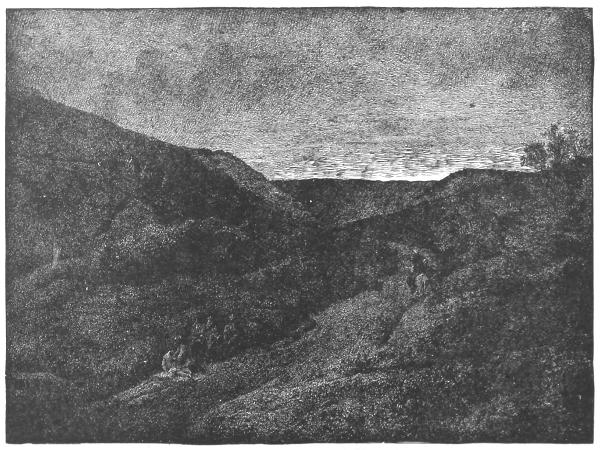
THE GOOD SAMARITAN.—Luke x. 33.
At one time when Jesus was with his disciples they asked him to teach them to pray. Having talked with them about the Lord’s Prayer, he illustrated prayer by the following:
Said he: “Suppose you had a friend to whom you should go one night at midnight, and ask him to lend you three loaves of bread, for a friend had arrived unexpectedly, and you had nothing for him. Suppose he should answer, ‘Don’t trouble me; I’ve shut my house for the night, and my children and I are in bed; I can’t get up and attend to you.’ Now I tell you, though he wouldn’t attend to you on account of friendship, yet if you persist in urging your need he will get up and give you what you want. Now I say to you: ask and it shall be given you; seek and ye shall find; knock and it shall be opened unto you. Every one that asks shall receive; he who seeks shall find; to him who knocks it shall be opened. Suppose your son asks for a piece of bread, would you give him a stone? Suppose he asks for a fish, would you give him a serpent? If he ask for an egg, would you give him a scorpion? Now, if you with evil hearts and ignorant minds, yet know enough to take care of your children and give them proper things, don’t you suppose that your Heavenly Father knows what you need, and will give the Holy Spirit to those who ask him?”
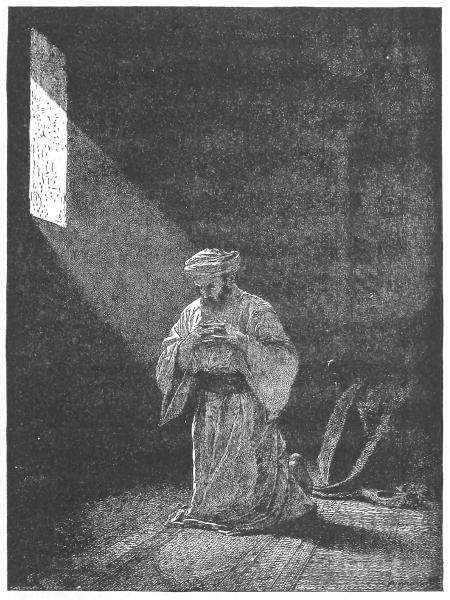
SECRET PRAYER.—Matt. vi. 6.
Jesus had been talking about the loving care of the Heavenly Father, and one of the listeners interrupted him with a request that he would talk to his brother and get him to divide equally between them the property that had been left. Jesus asked him who he thought made him a judge, or a divider over them; and then, by the story he told them, he showed the covetous thought that was in the man’s heart. He reminded them that the important thing in a man’s life was not to have a great deal of property. Said he: “There was a certain man who grew rich; his harvests were so great that he wondered what he should do with all his grain. At last he decided to pull down his barns and build larger ones, and then say to his soul, ‘Soul, you have plenty of food, enough to last you many years; take your ease, eat, drink and be merry.’ But just then God spoke to him; He said, ‘Foolish man, this night your soul shall be called to leave the body; then who will have all these things which you have provided?’—Now,” said Jesus, “the man who plans for himself, laying up treasures for himself, and has none of the riches that God could give him, is like this poor, foolish man in the story.” Then He turned to His disciples and told them that living meant more than simply keeping the body alive and clothed.
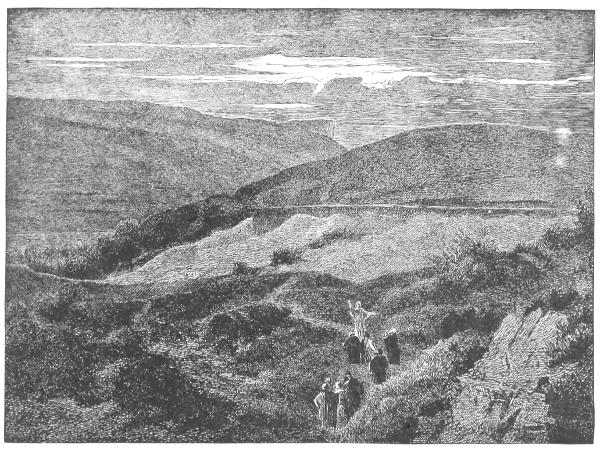
CONSIDER THE LILIES HOW THEY GROW.—Luke xii. 27.
Jesus was traveling through the cities and villages on his way to Jerusalem, teaching as he went. One day a man asked him if many would be saved. He said all must strive to enter in at the straight gate, for many would try some other way and would not get in. He said, “It was like a feast spread for guests; and when once the master of the house had closed the door, no more could get in. Those who stood outside saying, ‘Lord, Lord, open the door for us,’ would only be answered with ‘I don’t know you.’ They might answer, ‘We have eaten and drank with you, and you have taught in our streets,’ for some of these people who would not follow Jesus had sat at table with him and heard his teachings. But he said the answer to any such would be, ‘I don’t know you; go away, you are wicked people.’—Then,” said Jesus, “there shall be weeping and gnashing of teeth;” Abraham, and Isaac, and Jacob would be inside, but those who would not come to him by the right way would be thrust out. People from every quarter shall come together and sit down in God’s kingdom. The Gentiles, who were the last to hear the good news, shall be among the first in heaven, and some of the Jews (God’s dear people who would not love Him) will not get in.
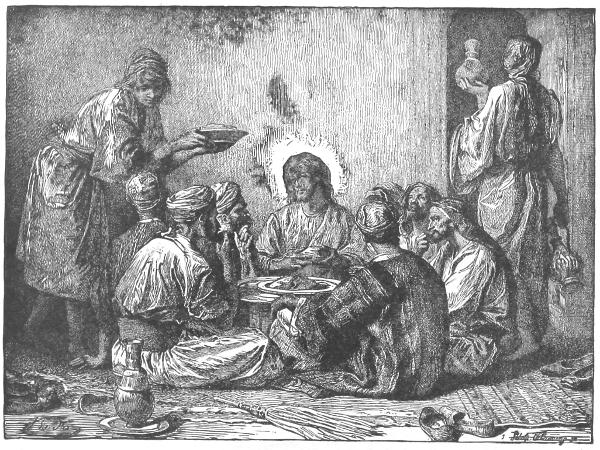
JESUS EATETH WITH PUBLICANS AND SINNERS.—Mark ii. 16.
One Sabbath-day Jesus was taking dinner at the house of a Pharisee. He talked with the people at the table about humility of manner at the great feasts which were given in those days. Then one of the company said to him, “Blessed is he that shall eat bread in the kingdom of God.” I do not think he meant heaven, but rather the kingdom that he hoped the Messiah would set up on the earth. Jesus answered him in the form of a story about a man who made a great supper, sending out many invitations. When everything was ready he sent for his guests to come, and every one of them sent an excuse. One said he had bought a piece of ground and must go and see it, and begged to be excused; another said he had bought five yoke of oxen, and was going to prove them; another said he had just been married and couldn’t come. When the servant came back and told his master he was angry. He told his servants to go out quickly through the streets and bring all the lame people, and the blind people, and the poor people of every sort. So the servant did as he was told; but he said to his master, “There is room yet.” So the master told him to go out in the highways and hedges, and coax people to come to the supper, and fill the house, for none of those who were first invited should be allowed to taste of the supper.
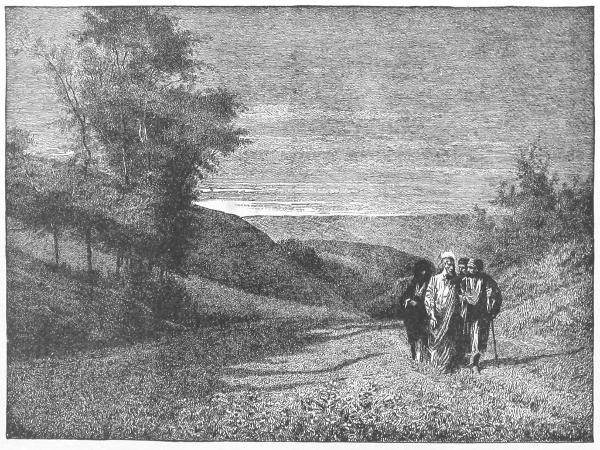
JESUS AND HIS DISCIPLES ON THE ROAD TO CÆSAREA.—Mark viii. 27.
Jesus once, in teaching the people, told this story: “A man had two sons; the younger of them asked his father to give him the part of the property that would finally belong to him. So the father divided his wealth between them. A few days after that the younger son went a long journey, taking all his money with him; but he wasted it in wild and foolish living. When it was all gone there came a great famine to that country, and the foolish young man had nothing to live on. He went looking for work, and a man hired him to take care of swine. He was so hungry that he was willing to eat the husks that the swine had for food; and no one gave anything to him. Then he began to think of his home, and to remember how his father’s servants had plenty to eat, and here he was starving! Then he said, ‘I will arise and go to my father, and I will say to him, Father, I have sinned against heaven and before you. I am not worthy to be called your son; let me be one of your hired servants.’ So he went on his journey home. When he was yet a great way from the house, his father saw him and ran out to meet him, and put his arms around him and kissed him. Then the son said, ‘Father, I have sinned against heaven and against you; I am not worthy to be called your son.’ But the father said, ‘bring the best clothes in the house for him to wear, and put a ring on his hand, and shoes on his feet, and have the fatted calf killed, and make a feast, and let us eat and drink and be merry; for my son was the same to me as dead, and now he is alive again; he was lost, but now he is found.’ And they were merry.”
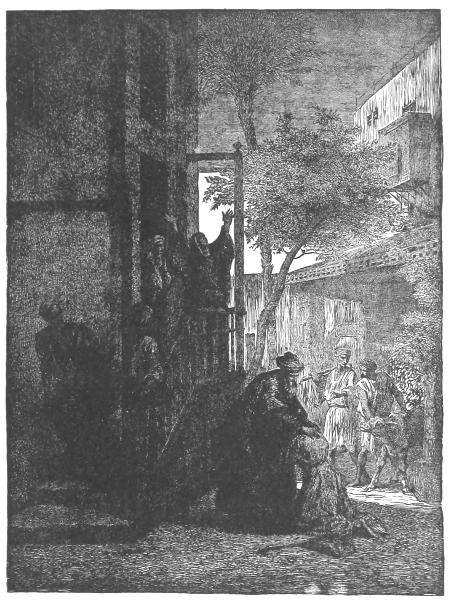
RETURN OF THE PRODIGAL SON.—Luke xv. 20.
In order to explain to his disciples that there were two worlds for souls, Jesus once told them this story:—“There was a rich man who wore elegant clothing and lived richly every day. There was a poor, sick beggar, named Lazarus, lying at his gate. He wanted the crumbs which were left from the rich man’s table. His body was full of sores, and the dogs used to come and lick them. One day this poor man died, but God sent his angels and carried him to heaven. Then the rich man died, and was buried. His soul went to hell. One day, while he was in that place of pain and torment, he looked up, and away off he saw heaven, and Lazarus the beggar was there, with his head on Abraham’s bosom. He called to him: ‘Father Abraham, have mercy on me, and send Lazarus to dip the tip of his finger in water and cool my tongue, for I am tormented in this flame.’ But Abraham said: ‘Son, remember that while you were living you had plenty of good things, while Lazarus suffered at your gate. Now he is happy, and you are suffering. And, besides, there is a great gulf between you and us, so that if we wanted to come to you we could not; neither can you come here from that place.’ Then the rich man said, ‘I pray you send him to my father’s house to tell my five brothers about this dreadful place, so they need not come here.’ But Abraham said, ‘Why, they have the story of that place. Moses wrote about it, and the Prophets wrote about it; let them read it.’ But the rich man said, ‘O, Father Abraham, if one went back to them from the dead, they would repent.’ ‘No,’ said Abraham, ‘if they will not believe God’s own word, as Moses and the Prophets wrote it in the Bible, neither would they believe if one went to them from the dead.’”
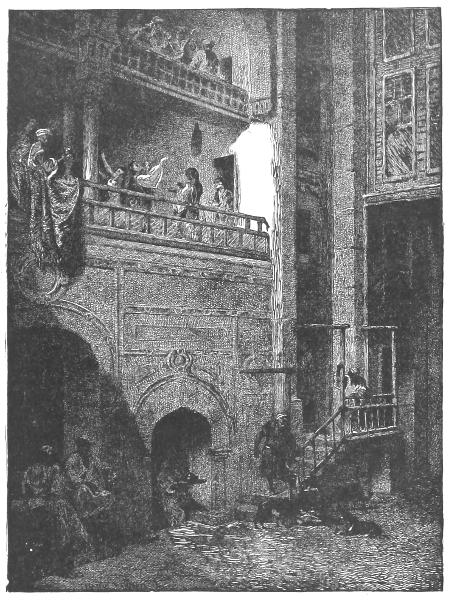
LAZARUS AT THE RICH MAN’S DOOR.—Luke xvi. 19.
One day Jesus, on his journey to Jerusalem, passed through a village in Samaria. He saw ten men who had the leprosy; they kept away from all other people, as the law obliged them to. But when they saw Jesus, they called out with loud voices, “Jesus, Master, have mercy on us!” Jesus said to them, “Go show yourselves to the priest.” This was what people who were cured of leprosy were obliged to do before they could go among the people. The priest had to give them a certificate to say that they were cured. As these ten men turned to go to the priest, as Jesus had told them, suddenly they found that they were well. One of them, as soon as he found it out, turned back and followed after Jesus, and when he reached him he bowed down at his feet, thanking him and praising God. He was from a Samaritan village; not one of the Lord’s chosen people, but a Gentile. Jesus said to him, “Didn’t I cure ten men? Where are the nine? Not one of them came back to thank me, except this Samaritan.” Then he said to the kneeling man, “Arise, and go on your way; your faith hath made you whole.”
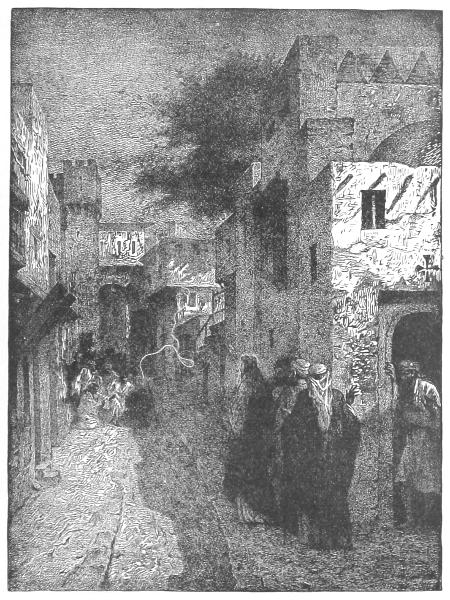
JESUS CURING THE TEN LEPERS.—Luke xvii. 14.
When Jesus was on earth he met some people who thought that they were perfect, and they despised other people. One day he told them this story: “There were two men who went to the temple one day to pray. One of them was a Pharisee, the other a publican. The Pharisee said, ‘God, I thank thee that I am not like other men, extortioners, unjust, adulterers, or even as this man beside me. I fast twice in the week, and I give a tenth of all that I have.’ Then the publican prayed: he did not even go close to the holy place: he kept his eyes on the ground, and he struck his breast, which was a sign of deep humility, as he said, ‘God be merciful to me, a sinner’—I tell you,” said Jesus, “that man went back to his home justified, rather than the other, for every one who thinks too well of himself must be humbled; but those who are humble God will exalt.”
The rest of the story is about some very little children being brought to Jesus. His disciples tried to have them sent away, for they did not understand Jesus; but he called the little ones to him and said: “Suffer little children to come unto me, and forbid them not, for of such is the kingdom of heaven. Truly I say to you, that any one who will not receive the kingdom of heaven with the faith of a little child shall never enter there.”
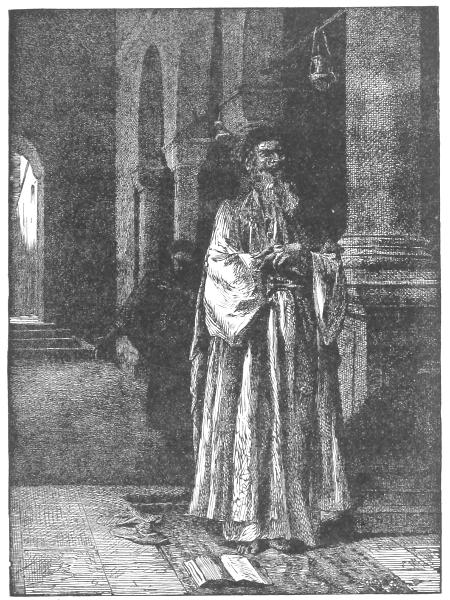
THE PHARISEE AND THE PUBLICAN.—Luke xviii. 10.
There was a man named Zaccheus, a rich man, a tax-gatherer, who wanted very much to see Jesus. One day, when Jesus was passing through the city of Jericho, Zaccheus, who was a small man and could not see over the heads of the crowd who were following Jesus, ran ahead of them and climbed into a sycamore tree. When Jesus reached the tree he looked up and said, “Zaccheus, make haste and come down; I want to go to your house to-day.” Then Zaccheus hurried down and joyfully took Jesus home with him. But the people murmured about it; they said, “He has gone to visit a wicked man.” Then Zaccheus talked with Jesus; he said to him, “Lord, I mean to give the half of all my goods to the poor; and if I have taken anything from any man wrongfully, I will give him back four times as much.” Then Jesus said to him, “This day is salvation come to your house. You are a Jew, a son of Abraham; you shall have the promised gift.”
Jesus, one day, talking with his disciples, said to them: “Take care that you are not deceived. There will be many coming in my name, saying, ‘I am Christ, and the end is near;’ but don’t follow after them. When you hear of wars and disturbances, don’t be frightened; these things must first come, but the end is not at once. Nation shall rise against nation, and kingdom against kingdom, and there shall be great earthquakes, and famines, and pestilences, and fearful sights; and great signs shall there be from heaven: and before these come, people will persecute you, and put you in prisons, and you shall be brought before kings and rulers, for my name’s sake. And you will have a chance to testify for me; but you need not plan what you shall say, for I will give you words that your enemies can neither answer nor resist. You will be betrayed by parents, brothers, relatives and friends, and some of you will be put to death; and you will be hated by men for my sake; but not a hair of your head shall perish. Be patient to the end, and your souls shall be saved. When you see Jerusalem surrounded with armies, then know that desolation is near. Then let them which are in Judea flee to the mountains, and let them which are in the midst of it depart out, and let not them which are in the countries enter thereinto.”
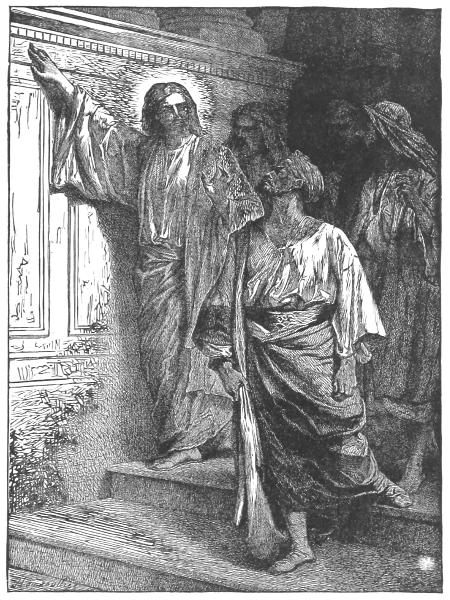
JESUS FORETELLS THE DESTRUCTION OF THE TEMPLE.—Matt. xxiv. 2.
It was the evening before Jesus was to be crucified that these things happened which are in our lesson to-day. Jesus sent Peter and John to make ready the supper, that they might eat it together. He said to them: “When you get to the city of Jerusalem, a man will meet you, carrying a pitcher of water; follow him and stop at the same house. Tell the man of the house that the Master told you to ask him where the guest-chamber was in which he could eat the Passover with his disciples. He will show you a large upper room, furnished. In that room make all things ready.” It all happened just as he said, and they prepared the supper. When Jesus and the twelve disciples sat down he said to them, “I have longed to eat this Passover with you before I suffer, for I will not eat of it any more until it be fulfilled in the kingdom of God.” Then he took up the cup and gave thanks, and said, “Take this and divide it among yourselves, for I say unto you, I shall not drink of the fruit of the vine until the kingdom of God shall come.” And he took bread and gave thanks, and gave the bread to them, saying, “This is my body which is given for you; do this in remembrance of me.” After supper he took the cup and passed it to them, saying, “This cup is the new testament in my blood, which is shed for you.”
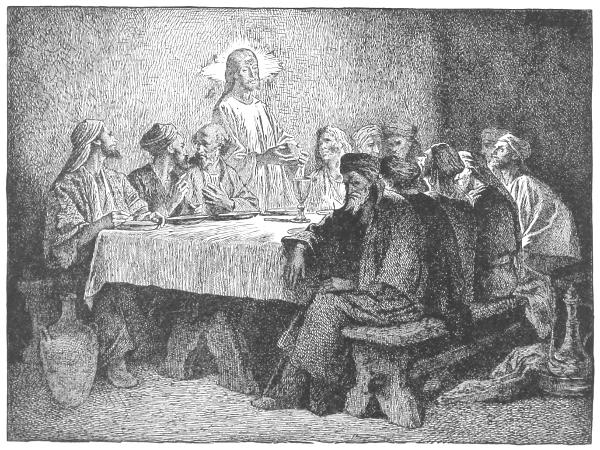
THE LAST SUPPER.—Matt. xxvi. 26.
At the place which is called Calvary, our Lord was crucified, and on the cross with him hung two thieves, one on each side. The soldiers divided his clothes among them, casting lots which should have them. He prayed for them all; he said, “Father, forgive them, for they know not what they do.” The people and the rulers stood about him, looking at him and mocking. They said, “He saved others, let him save himself if he is Christ, the chosen one of God.” And the soldiers also mocked him, offering him vinegar to drink, and saying to him, “If you are the king of the Jews, save yourself.” Then they wrote on a tablet in Greek, and in Latin, and in Hebrew, “This is the King of the Jews,” and hung it over the cross. One of the thieves joined in the mocking, saying, “If you are Christ, save yourself and us;” but the other thief reproved him, asking him if he did not fear God, since they were suffering the same punishment. “They,” he said, “deserved their punishment, but the other had done nothing wrong.” Then he spoke directly to Jesus: he said, “Lord, remember me when thou comest into thy kingdom.” And instantly Jesus answered him in these words, “Verily I say unto you, To-day shalt thou dwell with me in Paradise.” These things happened about twelve o’clock. From that time until three o’clock the earth was dark; the sun hid away. When Jesus cried out with a loud voice, he said, “It is finished;” and then, “Father, into thy hands I commit my spirit;” and having said this, he died. Just then the veil which had always hidden the inner temple split in two from top to bottom.
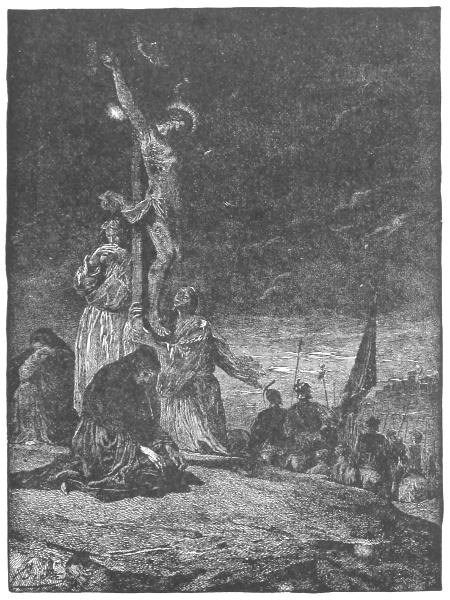
THE CRUCIFIXION.—John xix. 25.
The third day after Jesus was buried, two of his friends walked to a village named Emmaus, which was about seven miles from Jerusalem. As they walked along they talked together about the sad things that had lately happened. At that moment Jesus himself came along and joined them, but they did not know him. He asked them what it was they were talking about, and why they were so sad. One of them, named Cleopas, asked him if he was a stranger in Jerusalem that he had not heard the strange, sad news. He asked them, “What news?” And Cleopas answered: “Why, about Jesus of Nazareth; he was a mighty prophet; his words and his deeds were wonderful; but our rulers condemned him to death and crucified him. We hoped that he was the one who was to redeem the people of Israel; but this is the third day since these things were done. Some women who were at the grave this morning, told us a strange story; they say his body is not there, and that they saw angels who said that he was alive; and some of our friends went to the grave and found that it was as the women said, but they did not see him.” Then Jesus said to them: “O what foolish people. How slow you are to believe all that the prophets wrote about this! Did they not tell that Christ must suffer these things and then enter into his glory?” Then he began with the books that Moses wrote, and explained what he and the other writers had said about Christ. When they drew near to Emmaus the stranger acted as though he was going further, but they begged him to stop with them, as the day was nearly gone. So he stopped with them, and as they sat down to the table together, suddenly something opened their eyes to know that it was Jesus who sat with them. He took some bread and blessed it, and gave them some. Then he vanished out of their sight.
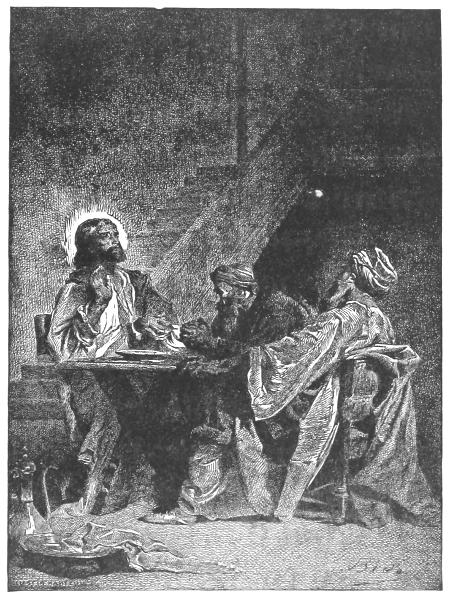
JESUS AND THE DISCIPLES AT EMMAUS.—Luke xxiv. 30.
The disciples and friends of Jesus were together talking of him and of the wonderful story that he had risen, when he appeared to them again and talked with them. He reminded them that the things which had happened were the very ones which he had foretold, and which were told in the Bible would happen. Then he explained the Bible to them and gave them wisdom to understand what he said. He showed them how it was written that Christ would come, and suffer and die, and rise again on the third day, and that repentance and forgiveness of sin should be preached to all people, beginning at Jerusalem. Then he told them they were the witnesses that all these things had taken place. Then he assured them that he would send to them that which the Father had promised they should have, and they were to wait in Jerusalem until God sent them a special power.
The last story that we have of the life of Jesus on earth was when he led his disciples out to Bethany, and, lifting up his hands, blessed them, and was parted from them and carried up into Heaven. Then the disciples worshiped him and returned to Jerusalem with great joy; and now they could be found continually in the temple, praising and blessing God.
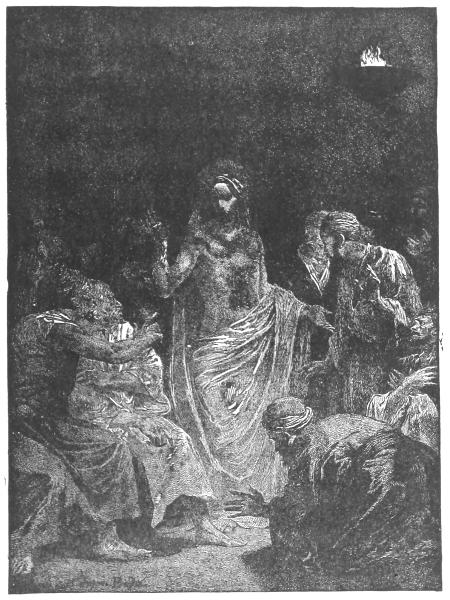
JESUS APPEARS TO HIS DISCIPLES.—Luke xxiv. 30.
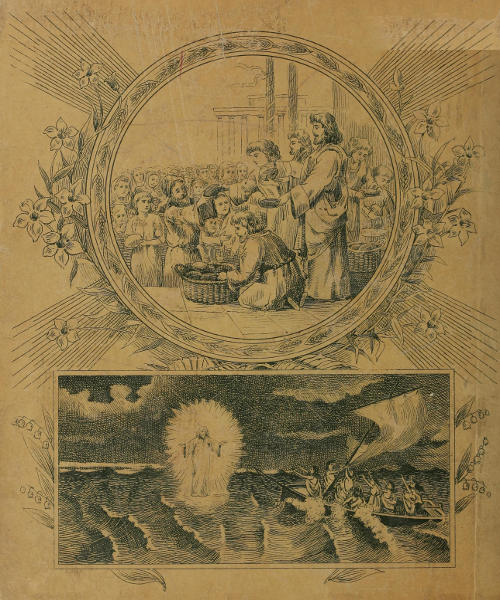
End of the Project Gutenberg EBook of Bible Pictures and Stories in Large
Print, by Isabella M. Aldon
*** END OF THIS PROJECT GUTENBERG EBOOK BIBLE PICTURES, STORIES--LARGE PRINT ***
***** This file should be named 60793-h.htm or 60793-h.zip *****
This and all associated files of various formats will be found in:
http://www.gutenberg.org/6/0/7/9/60793/
Produced by Richard Hulse and the Online Distributed
Proofreading Team at http://www.pgdp.net (This file was
produced from images generously made available by The
Internet Archive)
Updated editions will replace the previous one--the old editions will
be renamed.
Creating the works from print editions not protected by U.S. copyright
law means that no one owns a United States copyright in these works,
so the Foundation (and you!) can copy and distribute it in the United
States without permission and without paying copyright
royalties. Special rules, set forth in the General Terms of Use part
of this license, apply to copying and distributing Project
Gutenberg-tm electronic works to protect the PROJECT GUTENBERG-tm
concept and trademark. Project Gutenberg is a registered trademark,
and may not be used if you charge for the eBooks, unless you receive
specific permission. If you do not charge anything for copies of this
eBook, complying with the rules is very easy. You may use this eBook
for nearly any purpose such as creation of derivative works, reports,
performances and research. They may be modified and printed and given
away--you may do practically ANYTHING in the United States with eBooks
not protected by U.S. copyright law. Redistribution is subject to the
trademark license, especially commercial redistribution.
START: FULL LICENSE
THE FULL PROJECT GUTENBERG LICENSE
PLEASE READ THIS BEFORE YOU DISTRIBUTE OR USE THIS WORK
To protect the Project Gutenberg-tm mission of promoting the free
distribution of electronic works, by using or distributing this work
(or any other work associated in any way with the phrase "Project
Gutenberg"), you agree to comply with all the terms of the Full
Project Gutenberg-tm License available with this file or online at
www.gutenberg.org/license.
Section 1. General Terms of Use and Redistributing Project
Gutenberg-tm electronic works
1.A. By reading or using any part of this Project Gutenberg-tm
electronic work, you indicate that you have read, understand, agree to
and accept all the terms of this license and intellectual property
(trademark/copyright) agreement. If you do not agree to abide by all
the terms of this agreement, you must cease using and return or
destroy all copies of Project Gutenberg-tm electronic works in your
possession. If you paid a fee for obtaining a copy of or access to a
Project Gutenberg-tm electronic work and you do not agree to be bound
by the terms of this agreement, you may obtain a refund from the
person or entity to whom you paid the fee as set forth in paragraph
1.E.8.
1.B. "Project Gutenberg" is a registered trademark. It may only be
used on or associated in any way with an electronic work by people who
agree to be bound by the terms of this agreement. There are a few
things that you can do with most Project Gutenberg-tm electronic works
even without complying with the full terms of this agreement. See
paragraph 1.C below. There are a lot of things you can do with Project
Gutenberg-tm electronic works if you follow the terms of this
agreement and help preserve free future access to Project Gutenberg-tm
electronic works. See paragraph 1.E below.
1.C. The Project Gutenberg Literary Archive Foundation ("the
Foundation" or PGLAF), owns a compilation copyright in the collection
of Project Gutenberg-tm electronic works. Nearly all the individual
works in the collection are in the public domain in the United
States. If an individual work is unprotected by copyright law in the
United States and you are located in the United States, we do not
claim a right to prevent you from copying, distributing, performing,
displaying or creating derivative works based on the work as long as
all references to Project Gutenberg are removed. Of course, we hope
that you will support the Project Gutenberg-tm mission of promoting
free access to electronic works by freely sharing Project Gutenberg-tm
works in compliance with the terms of this agreement for keeping the
Project Gutenberg-tm name associated with the work. You can easily
comply with the terms of this agreement by keeping this work in the
same format with its attached full Project Gutenberg-tm License when
you share it without charge with others.
1.D. The copyright laws of the place where you are located also govern
what you can do with this work. Copyright laws in most countries are
in a constant state of change. If you are outside the United States,
check the laws of your country in addition to the terms of this
agreement before downloading, copying, displaying, performing,
distributing or creating derivative works based on this work or any
other Project Gutenberg-tm work. The Foundation makes no
representations concerning the copyright status of any work in any
country outside the United States.
1.E. Unless you have removed all references to Project Gutenberg:
1.E.1. The following sentence, with active links to, or other
immediate access to, the full Project Gutenberg-tm License must appear
prominently whenever any copy of a Project Gutenberg-tm work (any work
on which the phrase "Project Gutenberg" appears, or with which the
phrase "Project Gutenberg" is associated) is accessed, displayed,
performed, viewed, copied or distributed:
This eBook is for the use of anyone anywhere in the United States and
most other parts of the world at no cost and with almost no
restrictions whatsoever. You may copy it, give it away or re-use it
under the terms of the Project Gutenberg License included with this
eBook or online at www.gutenberg.org. If you are not located in the
United States, you'll have to check the laws of the country where you
are located before using this ebook.
1.E.2. If an individual Project Gutenberg-tm electronic work is
derived from texts not protected by U.S. copyright law (does not
contain a notice indicating that it is posted with permission of the
copyright holder), the work can be copied and distributed to anyone in
the United States without paying any fees or charges. If you are
redistributing or providing access to a work with the phrase "Project
Gutenberg" associated with or appearing on the work, you must comply
either with the requirements of paragraphs 1.E.1 through 1.E.7 or
obtain permission for the use of the work and the Project Gutenberg-tm
trademark as set forth in paragraphs 1.E.8 or 1.E.9.
1.E.3. If an individual Project Gutenberg-tm electronic work is posted
with the permission of the copyright holder, your use and distribution
must comply with both paragraphs 1.E.1 through 1.E.7 and any
additional terms imposed by the copyright holder. Additional terms
will be linked to the Project Gutenberg-tm License for all works
posted with the permission of the copyright holder found at the
beginning of this work.
1.E.4. Do not unlink or detach or remove the full Project Gutenberg-tm
License terms from this work, or any files containing a part of this
work or any other work associated with Project Gutenberg-tm.
1.E.5. Do not copy, display, perform, distribute or redistribute this
electronic work, or any part of this electronic work, without
prominently displaying the sentence set forth in paragraph 1.E.1 with
active links or immediate access to the full terms of the Project
Gutenberg-tm License.
1.E.6. You may convert to and distribute this work in any binary,
compressed, marked up, nonproprietary or proprietary form, including
any word processing or hypertext form. However, if you provide access
to or distribute copies of a Project Gutenberg-tm work in a format
other than "Plain Vanilla ASCII" or other format used in the official
version posted on the official Project Gutenberg-tm web site
(www.gutenberg.org), you must, at no additional cost, fee or expense
to the user, provide a copy, a means of exporting a copy, or a means
of obtaining a copy upon request, of the work in its original "Plain
Vanilla ASCII" or other form. Any alternate format must include the
full Project Gutenberg-tm License as specified in paragraph 1.E.1.
1.E.7. Do not charge a fee for access to, viewing, displaying,
performing, copying or distributing any Project Gutenberg-tm works
unless you comply with paragraph 1.E.8 or 1.E.9.
1.E.8. You may charge a reasonable fee for copies of or providing
access to or distributing Project Gutenberg-tm electronic works
provided that
* You pay a royalty fee of 20% of the gross profits you derive from
the use of Project Gutenberg-tm works calculated using the method
you already use to calculate your applicable taxes. The fee is owed
to the owner of the Project Gutenberg-tm trademark, but he has
agreed to donate royalties under this paragraph to the Project
Gutenberg Literary Archive Foundation. Royalty payments must be paid
within 60 days following each date on which you prepare (or are
legally required to prepare) your periodic tax returns. Royalty
payments should be clearly marked as such and sent to the Project
Gutenberg Literary Archive Foundation at the address specified in
Section 4, "Information about donations to the Project Gutenberg
Literary Archive Foundation."
* You provide a full refund of any money paid by a user who notifies
you in writing (or by e-mail) within 30 days of receipt that s/he
does not agree to the terms of the full Project Gutenberg-tm
License. You must require such a user to return or destroy all
copies of the works possessed in a physical medium and discontinue
all use of and all access to other copies of Project Gutenberg-tm
works.
* You provide, in accordance with paragraph 1.F.3, a full refund of
any money paid for a work or a replacement copy, if a defect in the
electronic work is discovered and reported to you within 90 days of
receipt of the work.
* You comply with all other terms of this agreement for free
distribution of Project Gutenberg-tm works.
1.E.9. If you wish to charge a fee or distribute a Project
Gutenberg-tm electronic work or group of works on different terms than
are set forth in this agreement, you must obtain permission in writing
from both the Project Gutenberg Literary Archive Foundation and The
Project Gutenberg Trademark LLC, the owner of the Project Gutenberg-tm
trademark. Contact the Foundation as set forth in Section 3 below.
1.F.
1.F.1. Project Gutenberg volunteers and employees expend considerable
effort to identify, do copyright research on, transcribe and proofread
works not protected by U.S. copyright law in creating the Project
Gutenberg-tm collection. Despite these efforts, Project Gutenberg-tm
electronic works, and the medium on which they may be stored, may
contain "Defects," such as, but not limited to, incomplete, inaccurate
or corrupt data, transcription errors, a copyright or other
intellectual property infringement, a defective or damaged disk or
other medium, a computer virus, or computer codes that damage or
cannot be read by your equipment.
1.F.2. LIMITED WARRANTY, DISCLAIMER OF DAMAGES - Except for the "Right
of Replacement or Refund" described in paragraph 1.F.3, the Project
Gutenberg Literary Archive Foundation, the owner of the Project
Gutenberg-tm trademark, and any other party distributing a Project
Gutenberg-tm electronic work under this agreement, disclaim all
liability to you for damages, costs and expenses, including legal
fees. YOU AGREE THAT YOU HAVE NO REMEDIES FOR NEGLIGENCE, STRICT
LIABILITY, BREACH OF WARRANTY OR BREACH OF CONTRACT EXCEPT THOSE
PROVIDED IN PARAGRAPH 1.F.3. YOU AGREE THAT THE FOUNDATION, THE
TRADEMARK OWNER, AND ANY DISTRIBUTOR UNDER THIS AGREEMENT WILL NOT BE
LIABLE TO YOU FOR ACTUAL, DIRECT, INDIRECT, CONSEQUENTIAL, PUNITIVE OR
INCIDENTAL DAMAGES EVEN IF YOU GIVE NOTICE OF THE POSSIBILITY OF SUCH
DAMAGE.
1.F.3. LIMITED RIGHT OF REPLACEMENT OR REFUND - If you discover a
defect in this electronic work within 90 days of receiving it, you can
receive a refund of the money (if any) you paid for it by sending a
written explanation to the person you received the work from. If you
received the work on a physical medium, you must return the medium
with your written explanation. The person or entity that provided you
with the defective work may elect to provide a replacement copy in
lieu of a refund. If you received the work electronically, the person
or entity providing it to you may choose to give you a second
opportunity to receive the work electronically in lieu of a refund. If
the second copy is also defective, you may demand a refund in writing
without further opportunities to fix the problem.
1.F.4. Except for the limited right of replacement or refund set forth
in paragraph 1.F.3, this work is provided to you 'AS-IS', WITH NO
OTHER WARRANTIES OF ANY KIND, EXPRESS OR IMPLIED, INCLUDING BUT NOT
LIMITED TO WARRANTIES OF MERCHANTABILITY OR FITNESS FOR ANY PURPOSE.
1.F.5. Some states do not allow disclaimers of certain implied
warranties or the exclusion or limitation of certain types of
damages. If any disclaimer or limitation set forth in this agreement
violates the law of the state applicable to this agreement, the
agreement shall be interpreted to make the maximum disclaimer or
limitation permitted by the applicable state law. The invalidity or
unenforceability of any provision of this agreement shall not void the
remaining provisions.
1.F.6. INDEMNITY - You agree to indemnify and hold the Foundation, the
trademark owner, any agent or employee of the Foundation, anyone
providing copies of Project Gutenberg-tm electronic works in
accordance with this agreement, and any volunteers associated with the
production, promotion and distribution of Project Gutenberg-tm
electronic works, harmless from all liability, costs and expenses,
including legal fees, that arise directly or indirectly from any of
the following which you do or cause to occur: (a) distribution of this
or any Project Gutenberg-tm work, (b) alteration, modification, or
additions or deletions to any Project Gutenberg-tm work, and (c) any
Defect you cause.
Section 2. Information about the Mission of Project Gutenberg-tm
Project Gutenberg-tm is synonymous with the free distribution of
electronic works in formats readable by the widest variety of
computers including obsolete, old, middle-aged and new computers. It
exists because of the efforts of hundreds of volunteers and donations
from people in all walks of life.
Volunteers and financial support to provide volunteers with the
assistance they need are critical to reaching Project Gutenberg-tm's
goals and ensuring that the Project Gutenberg-tm collection will
remain freely available for generations to come. In 2001, the Project
Gutenberg Literary Archive Foundation was created to provide a secure
and permanent future for Project Gutenberg-tm and future
generations. To learn more about the Project Gutenberg Literary
Archive Foundation and how your efforts and donations can help, see
Sections 3 and 4 and the Foundation information page at
www.gutenberg.org
Section 3. Information about the Project Gutenberg Literary Archive Foundation
The Project Gutenberg Literary Archive Foundation is a non profit
501(c)(3) educational corporation organized under the laws of the
state of Mississippi and granted tax exempt status by the Internal
Revenue Service. The Foundation's EIN or federal tax identification
number is 64-6221541. Contributions to the Project Gutenberg Literary
Archive Foundation are tax deductible to the full extent permitted by
U.S. federal laws and your state's laws.
The Foundation's principal office is in Fairbanks, Alaska, with the
mailing address: PO Box 750175, Fairbanks, AK 99775, but its
volunteers and employees are scattered throughout numerous
locations. Its business office is located at 809 North 1500 West, Salt
Lake City, UT 84116, (801) 596-1887. Email contact links and up to
date contact information can be found at the Foundation's web site and
official page at www.gutenberg.org/contact
For additional contact information:
Dr. Gregory B. Newby
Chief Executive and Director
gbnewby@pglaf.org
Section 4. Information about Donations to the Project Gutenberg
Literary Archive Foundation
Project Gutenberg-tm depends upon and cannot survive without wide
spread public support and donations to carry out its mission of
increasing the number of public domain and licensed works that can be
freely distributed in machine readable form accessible by the widest
array of equipment including outdated equipment. Many small donations
($1 to $5,000) are particularly important to maintaining tax exempt
status with the IRS.
The Foundation is committed to complying with the laws regulating
charities and charitable donations in all 50 states of the United
States. Compliance requirements are not uniform and it takes a
considerable effort, much paperwork and many fees to meet and keep up
with these requirements. We do not solicit donations in locations
where we have not received written confirmation of compliance. To SEND
DONATIONS or determine the status of compliance for any particular
state visit www.gutenberg.org/donate
While we cannot and do not solicit contributions from states where we
have not met the solicitation requirements, we know of no prohibition
against accepting unsolicited donations from donors in such states who
approach us with offers to donate.
International donations are gratefully accepted, but we cannot make
any statements concerning tax treatment of donations received from
outside the United States. U.S. laws alone swamp our small staff.
Please check the Project Gutenberg Web pages for current donation
methods and addresses. Donations are accepted in a number of other
ways including checks, online payments and credit card donations. To
donate, please visit: www.gutenberg.org/donate
Section 5. General Information About Project Gutenberg-tm electronic works.
Professor Michael S. Hart was the originator of the Project
Gutenberg-tm concept of a library of electronic works that could be
freely shared with anyone. For forty years, he produced and
distributed Project Gutenberg-tm eBooks with only a loose network of
volunteer support.
Project Gutenberg-tm eBooks are often created from several printed
editions, all of which are confirmed as not protected by copyright in
the U.S. unless a copyright notice is included. Thus, we do not
necessarily keep eBooks in compliance with any particular paper
edition.
Most people start at our Web site which has the main PG search
facility: www.gutenberg.org
This Web site includes information about Project Gutenberg-tm,
including how to make donations to the Project Gutenberg Literary
Archive Foundation, how to help produce our new eBooks, and how to
subscribe to our email newsletter to hear about new eBooks.